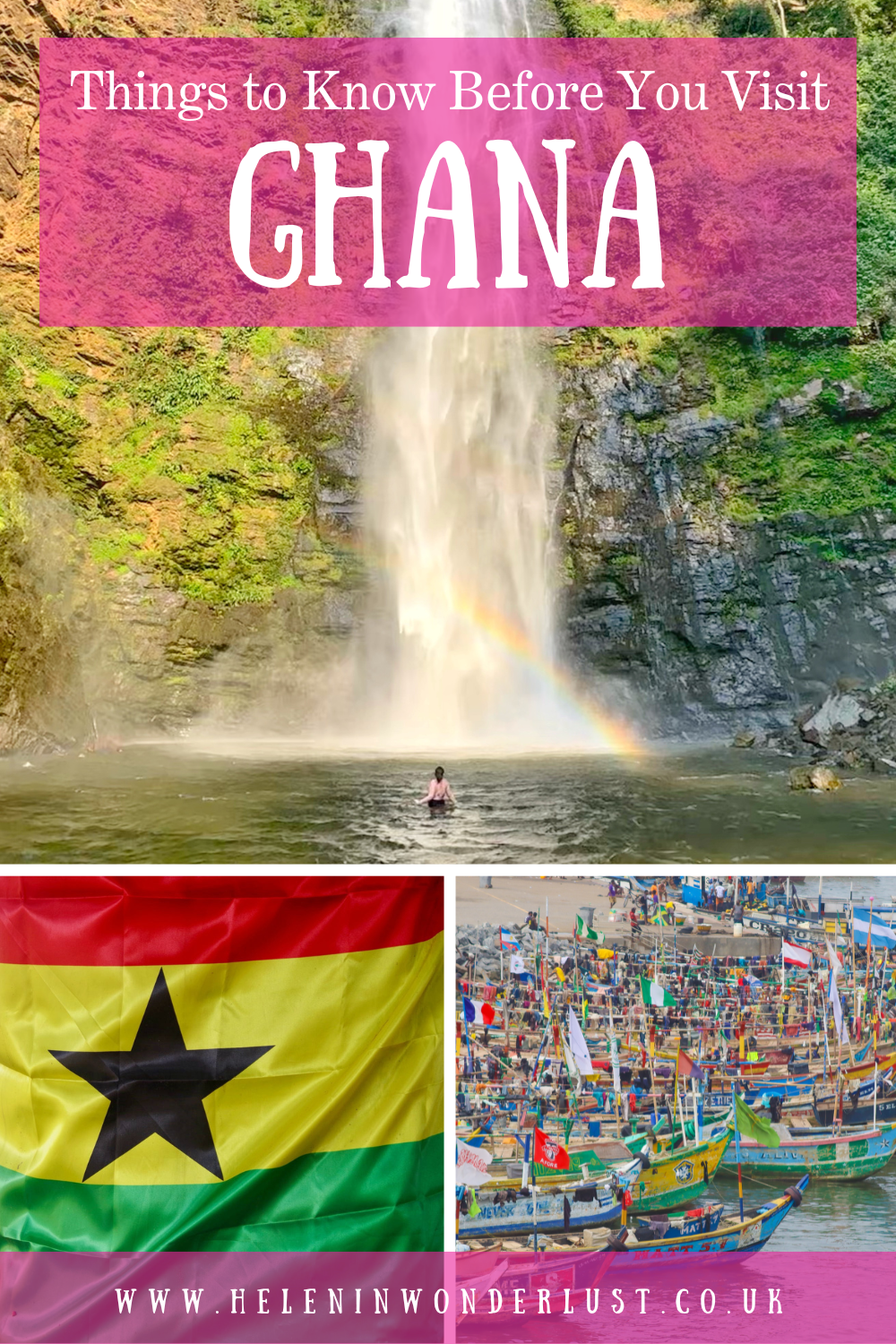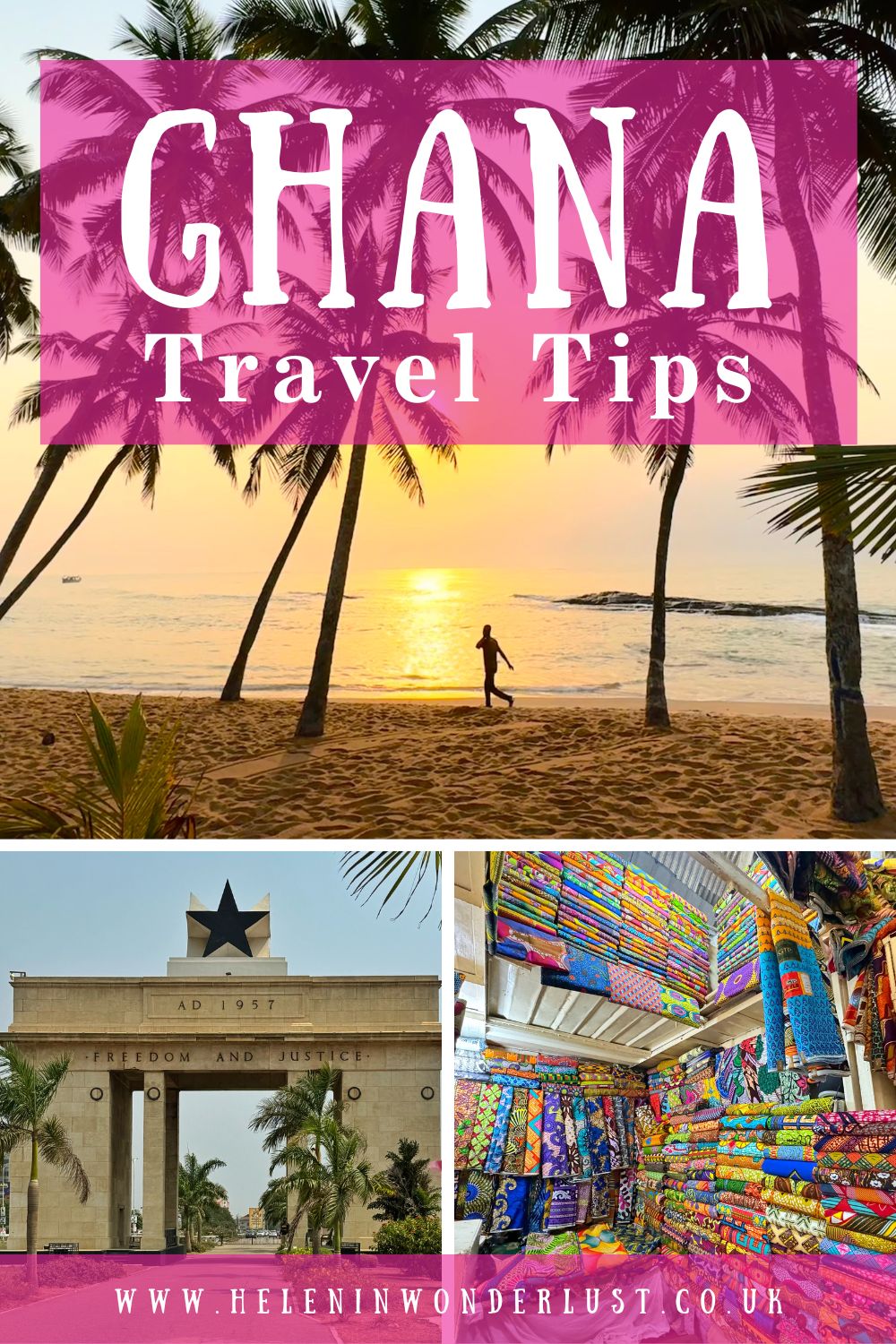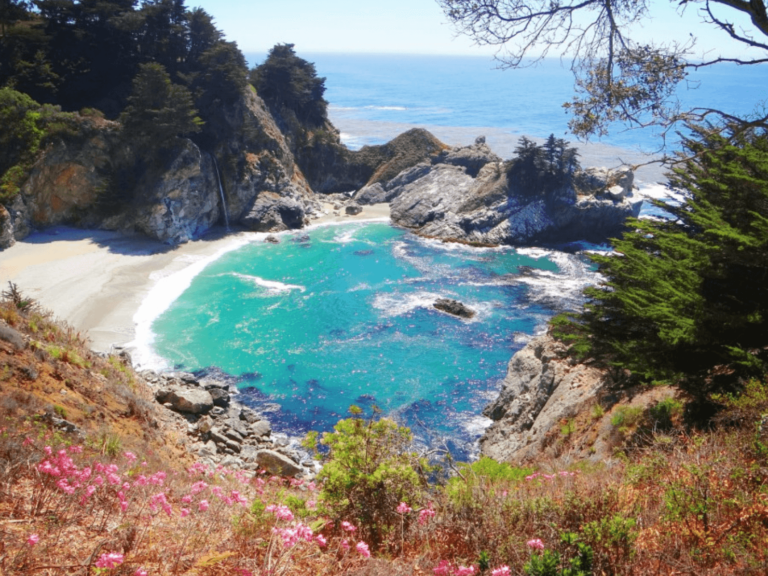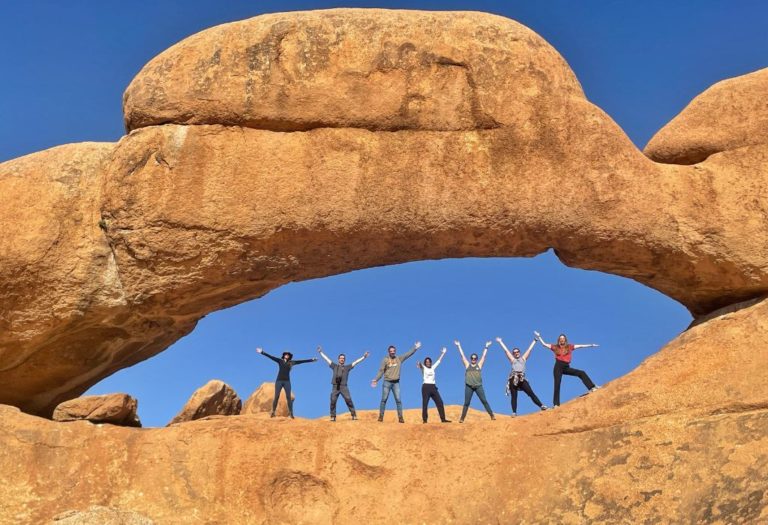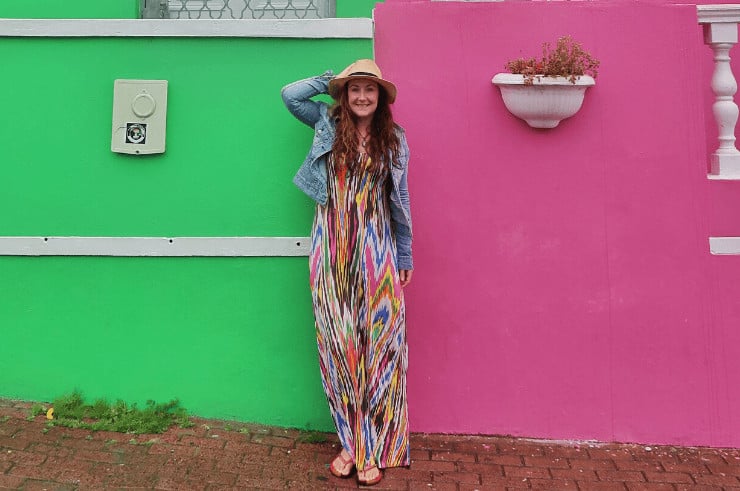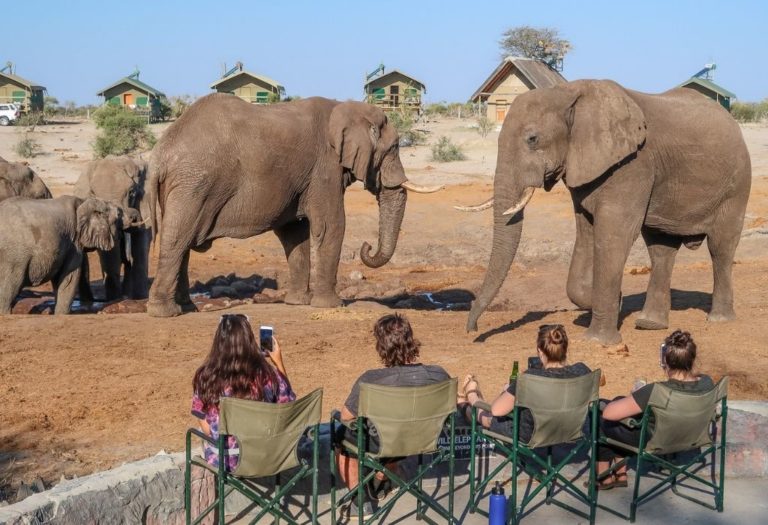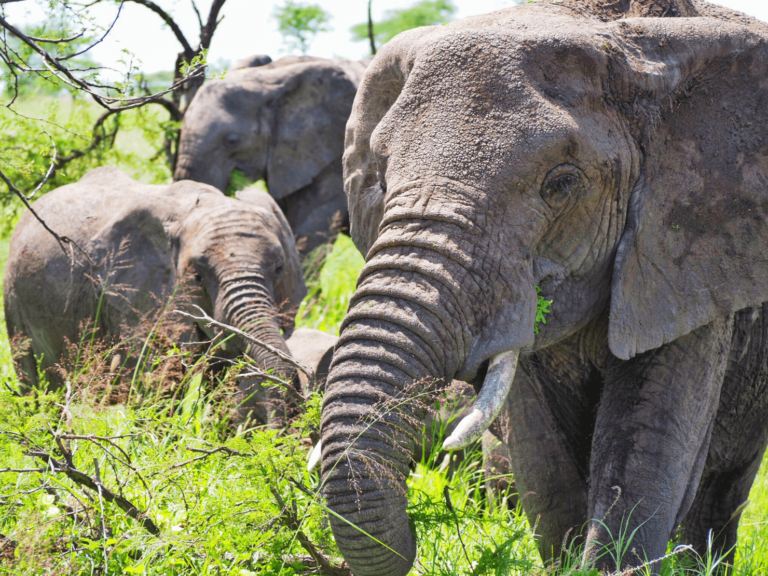Things to Know Before You Visit Ghana
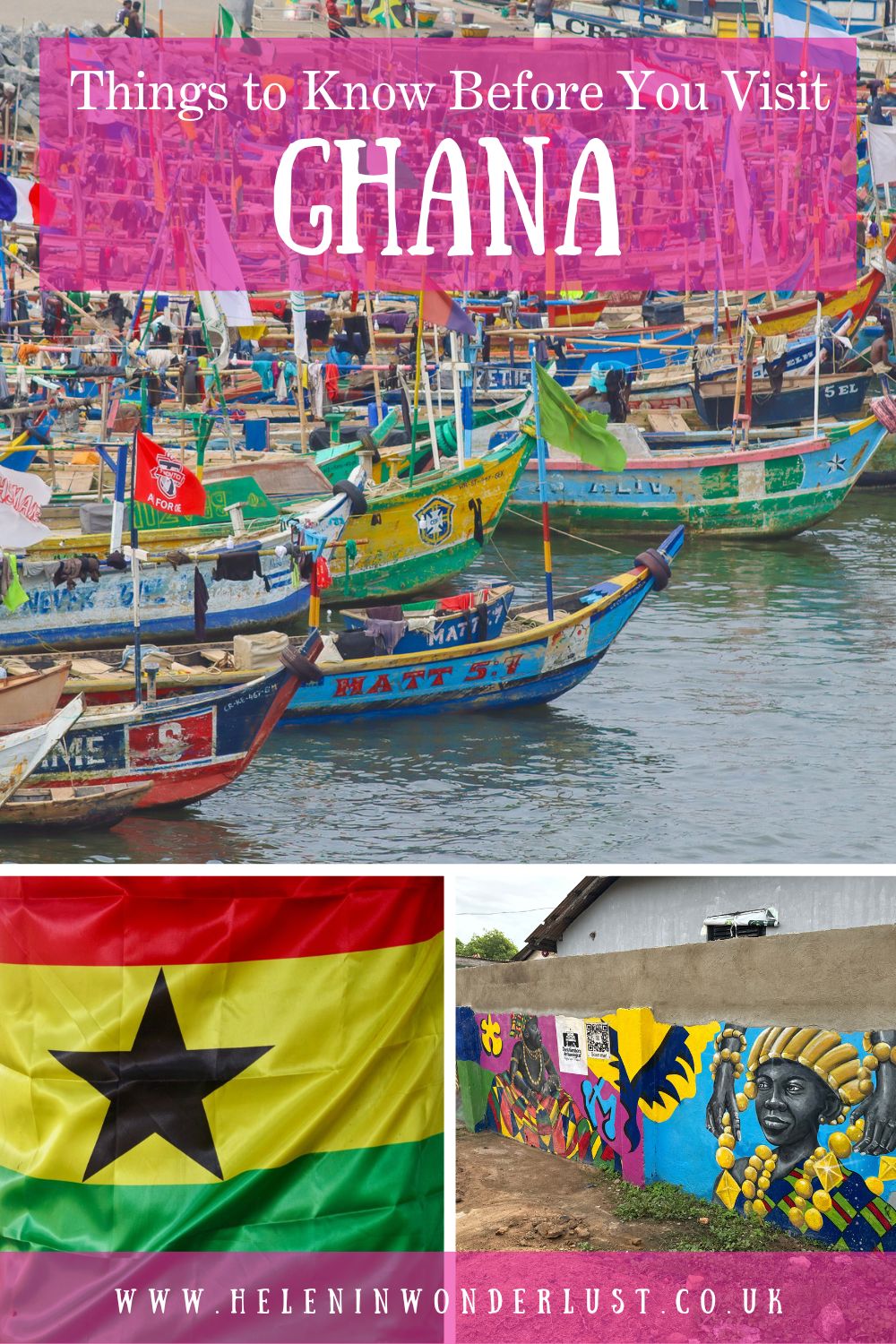
Last updated on January 9th, 2025 at 03:24 pm
In 2024, I embarked on my first visit to Ghana, a long-awaited dream destination in West Africa, as part of a recce trip to prepare for one of my upcoming group tours through Ghana, Benin, and Togo.
While I had already explored Benin and Togo, Ghana had always been high on my travel bucket list, but I’d never quite gotten around to actually going, but in 2024, I went twice!
The first trip came together quite unexpectedly – an exciting opportunity made possible by Ghana’s temporary visa-on-arrival policy for holiday visitors, introduced between 1st December 2023, and 15th January 2024. This initiative, a welcome alternative to the typically lengthy visa application process, was a real game-changer. I only hope Ghana repeats it in the future!
Ghana is often referred to as the “Gateway to Africa,” a title earned through its rich history, strategic location, political stability, and profound cultural heritage and it didn’t take long for me to fall in love with this extraordinary country and I’m excited to share that passion with others.
So to help you plan a safe, enjoyable, and unforgettable journey, I’ve compiled a handy list of tips of things to know before you visit Ghana.
PS. Did you know that I organise Ghana (plus Benin & Togo) group trips? Click here for details.
Please Note: Some of the links in this post are affiliate links, which will earn me a small commission at no extra cost to you. Affiliate sales help with the running costs of this site, so thank you for your support!
Things to Know Before You Visit Ghana
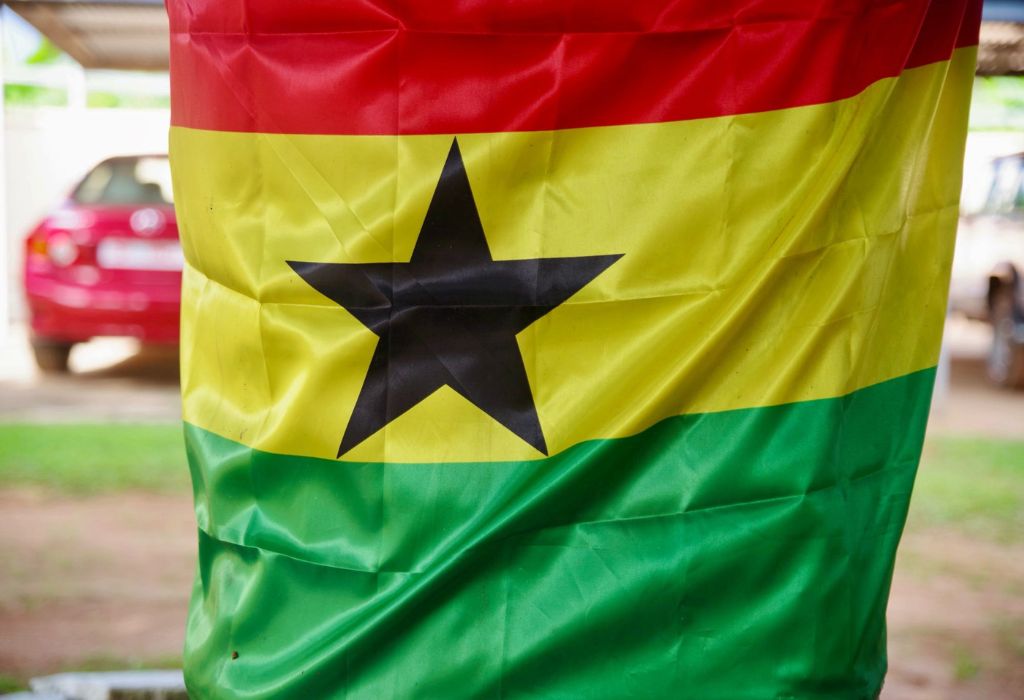
Planning Your Trip to Ghana
Why Visit Ghana?
If you’re reading this, chances are you’re already curious about Ghana—or maybe you’ve just heard the name, seen a few photos, and started diving into some research. Well, let me tell you a bit about this incredible country!
Ghana is a vibrant and captivating destination, rich in history, culture, and character. Its complex past includes a significant role in the transatlantic slave trade, as evidenced by the UNESCO World Heritage-listed castles at Cape Coast and Elmina. Visiting these sites offers a poignant and deeply moving insight into this chapter of human history.
In 2019, Ghana launched the ‘Year of Return,’ commemorating 400 years since the first enslaved Africans were taken to America. This initiative highlighted Ghana’s commitment to welcoming the African diaspora back to their ancestral homeland, fostering connections and reconciliation.
Ghana also plays a major role in the global economy as the world’s second-largest producer of cocoa. From the chocolate you enjoy to the livelihoods of many Ghanaians, cocoa is a vital part of the country’s identity and economy. Learning about Ghana’s cocoa production, or even visiting a cocoa farm, is a fascinating way to connect with this significant aspect of its culture.
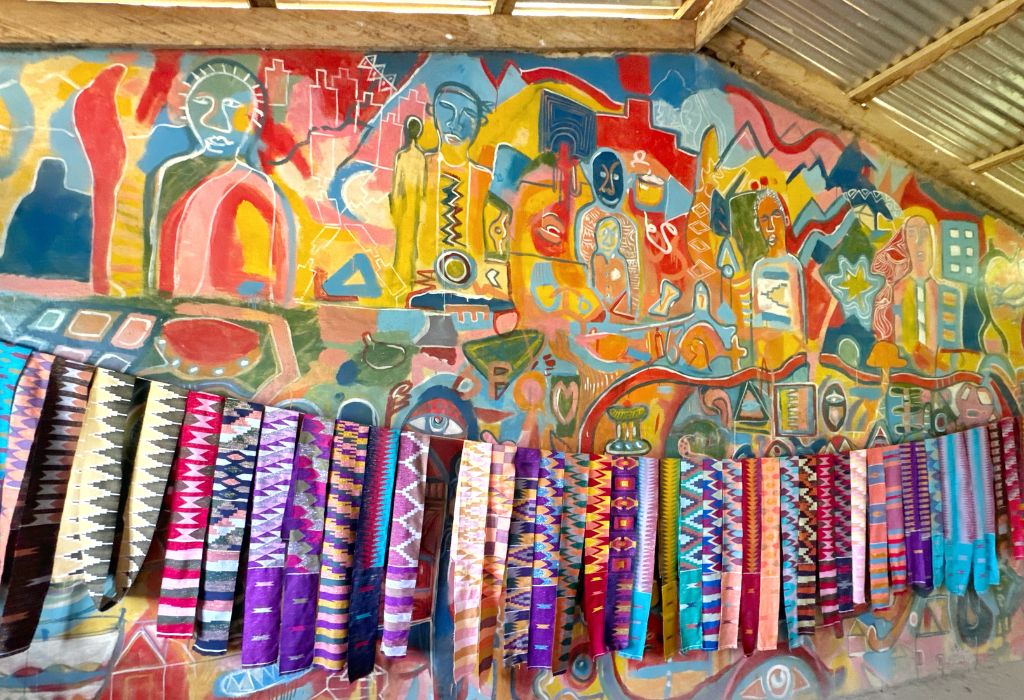
Like many African nations, Ghana faces challenges with poverty and corruption. However, it also stands out—it was the first sub-Saharan African country to gain independence after colonial rule, and it’s a relatively prosperous country with political stability (always a big plus)! It’s a fantastic introduction to West Africa, especially for English speakers, as Ghana’s official language is English—unlike most of its Francophone neighbors.
If you’re considering a trip to West Africa, Ghana is an excellent place to start. I absolutely loved my time there, and I can’t recommend it enough!
Where is Ghana?
Ghana is located in West Africa. It borders Ivory Coast, to the east, Togo to the west and Burkina Faso to the north and the Gulf of Guinea/Atlantic Ocean to the south.
The capital, Accra, lies right on the coast and it reminds me a little bit of a mix between Nairobi in Kenya (the city set up/roads – which may be partly down to the British colonial influence) and Dar es Salaam in Tanzania (the tropical city vibes).
Geographically, Ghana is located directly south of the UK and operates on Greenwich Mean Time (GMT), which means it shares the same timezone as the UK for half the year. Unlike the UK, Ghana does not observe daylight saving time.
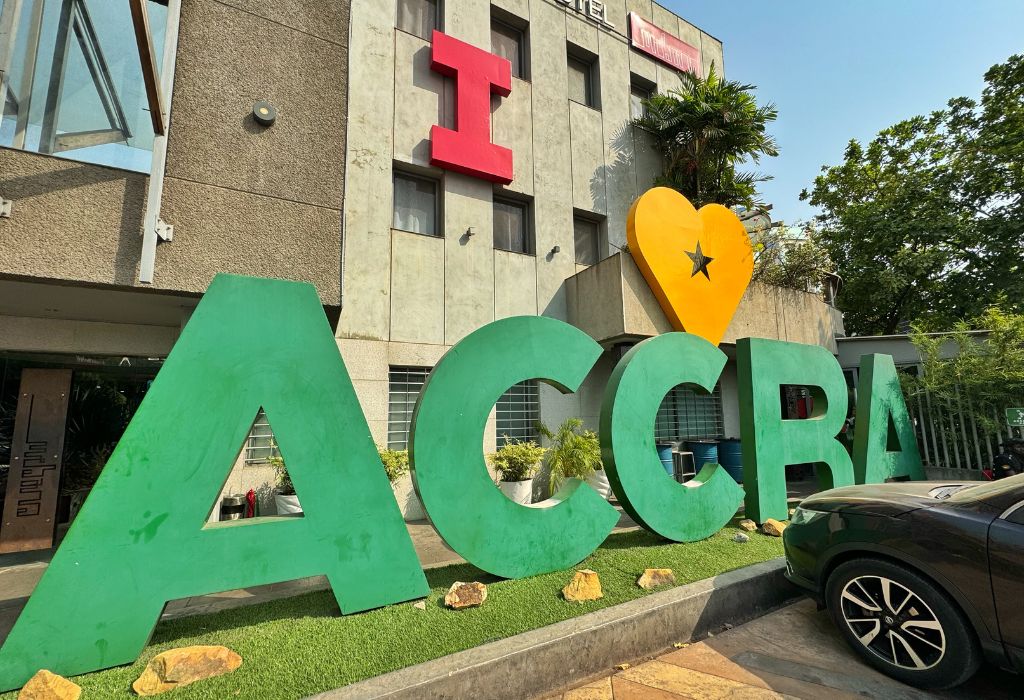
How to Get to Ghana
Ghana is a relatively easy country to get to, with connecting flights from cities in Africa, Europe, the US and the Middle East. These include London, Amsterdam, Paris, Istanbul, Nairobi, Washington, New York, Dubai, Qatar and Lisbon etc, so there’s plenty of competition, keeping those flights reasonably priced.
Return flights from the UK start from around £600.
The main airport is called Katoka International Airport (ACC) in Accra. There are also a few other airports in Ghana including Kumasi and Tamale.
I always look for my flights on Skyscanner, which allows you to compare flights from different airlines – you can then book direct with the airline or through a third party online travel agency.
The airport is very close to the city, so expect to pay no more than around 55 – 65 Cedis ($4 – $5) in an Uber from the airport to the city centre.
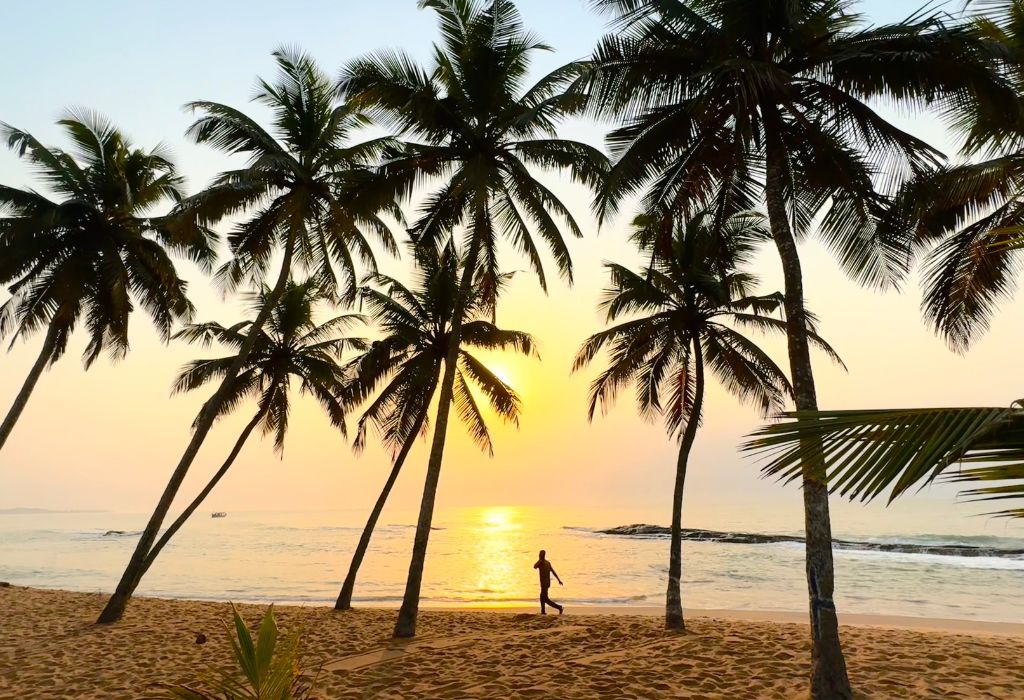
The Best Time to Visit Ghana
With climate change, the weather has become a lot more unpredictable, but here’s a general idea of what to expect in Ghana. Just keep in mind, things aren’t as reliable as they used to be! As we sat together during a thunderstorm, our driver, Apia, mentioned how surprising it was to see rain in November – he said that never happened when he was younger!
The seasons are shifting, but one thing that’s true, is that Ghana is pretty HOT most of the time. In the Volta region in January, it did cool down enough for me to wear a light jacket in the evenings, but the days were scorching!
The best time to visit Ghana is generally during the dry season, which runs from late October/November (sometimes December) to March. During this time, the roads will be much easier to travel on, especially the untarmacked ones, of which there are many. However, even in the dry season, some of these roads are in terrible condition, so during the wet season, they can be a real challenge.
In the south, the rainiest months are April to June (with June seeing the most rainfall), then there’s a little respite in July and August, then more rain in September and October (although not as heavy as April to June). The south tends to be dryer than the north overall.
In the north, the rains last from around May to September, with September being the rainiest month. The rain can make the north very difficult for travellers. The ‘coolest’ month is August, but that’s still pretty hot. The hottest months are usually March/April. The driest month is usually January, whilst the wettest month is usually June.
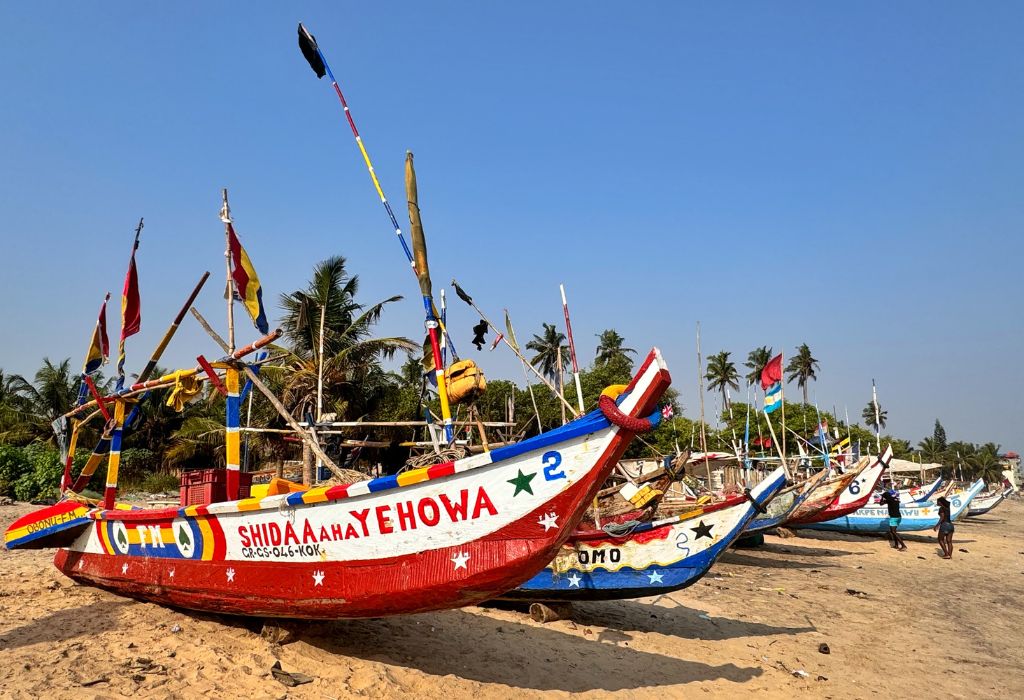
One of my guides said that August was his favourite month as the rain is low and the country is nice and green. Although some of the roads may still be pretty muddy, so a 4×4 might be better than a regular car and just be aware of flooding in the north.
Just be aware that the Harmattan (winds that bring dust from the Sahara) takes place between late November and March, causing a haze to fall over the country. This makes it slightly less humid, but can also makes photographs look a little dull. And make your skin very dry, so take moisturiser!
If you want to experience one of Africa’s best music festivals, AfroFuture (formerly Afrochella) usually takes place between Christmas and New Year at Accra’s El Wak Stadium.
But, whatever time of year you go, just make peace with the fact that you will be pretty hot and sweaty most of the time and take a handheld fan of some description – you can also buy them there. They are an absolute lifesaver – you can thank me later!
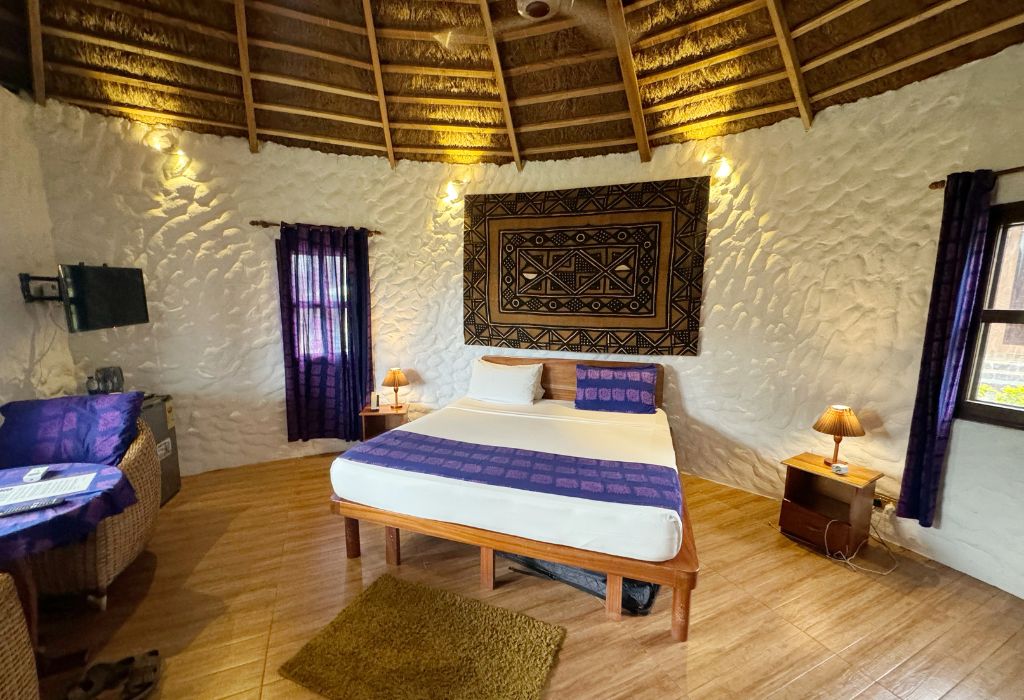
Accommodation in Ghana
For West Africa, Ghana has some good, reasonably priced accommodations, from hostels and to cheap guesthouses to apartments and high-end hotels.
Booking.com has a good selection of properties in Ghana, but I will write an itinerary post with accommodation recommendations (and things to do) soon!
Key Highlights of Ghana
Ghana has many charms, but here are some of the places you may want to include in your trip.
- Accra: The vibrant capital city.
- Cape Coast & Elmina: Fishing towns and two UNESCO World Heritage Sites that played significant roles in the transatlantic slave trade (I prefer Elmina to Cape Coast).
- Mole National Park: Safari and wildlife adventures.
- Volta Region: Lakes, mountains, Mona monkeys (they cute, not scary) and waterfalls.
- Busua Beach: A surfer’s paradise with gorgeous beaches and nightlife, halfway between Cape Coast and Ivory Coast.
- Kokrobite: Lively spot near to Accra.
- Aburi Botanical Gardens: Beautiful spot to visit, with a wide variety of tropical and subtropical plants.
- Lake Bosumtwi: A beautiful lake that is rich in cultural significance.
- Kumasi: A large town and the heart of Ashanti Region.
I promise I will write a post of the best things to do in Ghana soon!
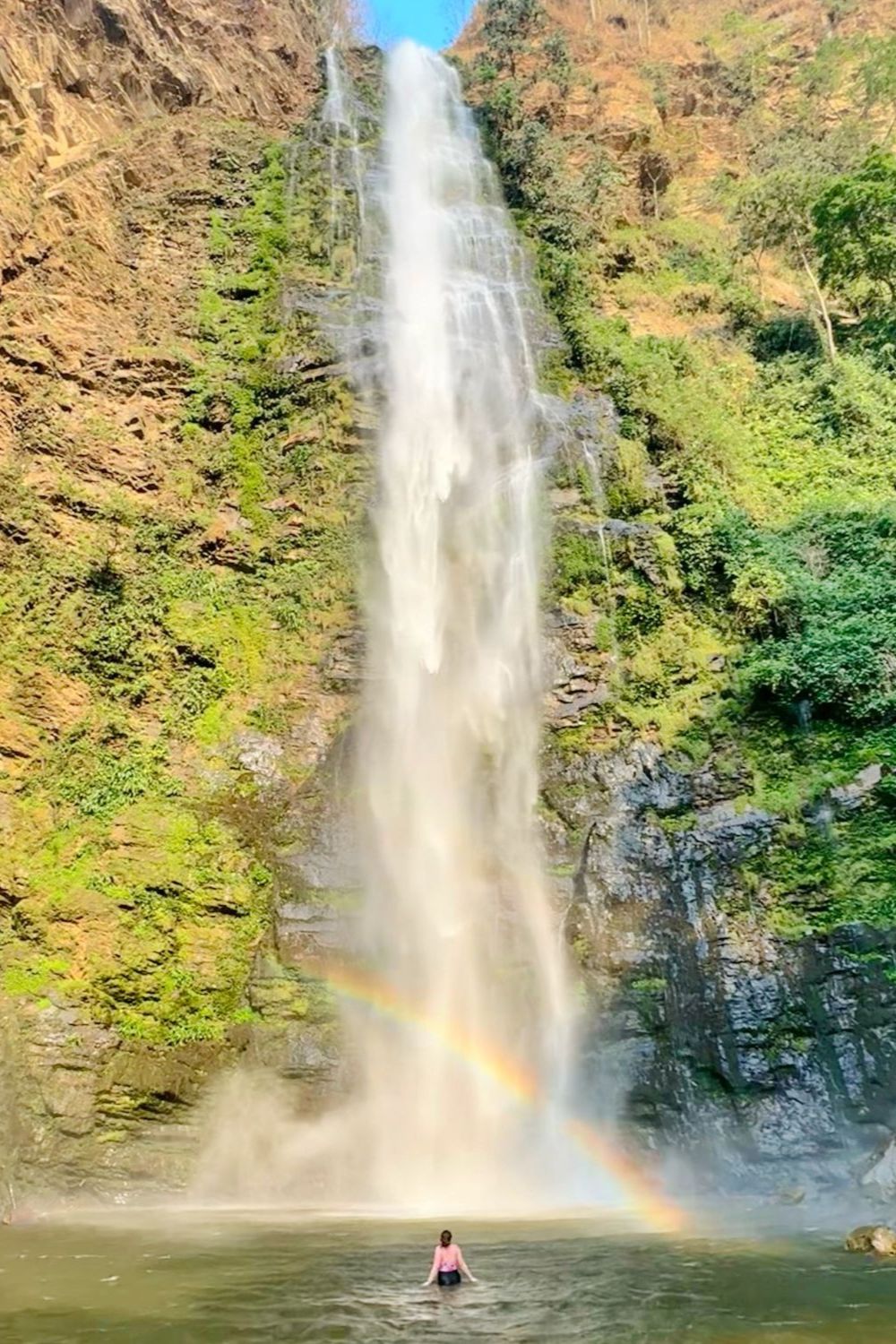
Entry Requirements
Visas
Visitors usually need a visa to enter Ghana, unless they come from a country that is visa exempt or that is allowed to get visa on arrival (most countries that fall into these categories are in Africa and the Caribbean). You can see the visa policy of Ghana here.
For those of us who do need a visa (which includes citizens of UK, US, Australian, Canadian and most of Europe), Ghana isn’t the easiest place to visit on a whim and most nationalities need to apply in advance online here. The normal process sees you sending off your passport (with a self-addressed envelope) to your nearest embassy using a recorded delivery service. They say that the visa takes around 10 – 20 days to process.
Unfortunately, you’re unable to apply more than 3 months in advance, which can be challenging – especially if you’re already travelling in the months directly leading up to your visit to Ghana or, like me, need your passport frequently and struggle to find a 3 – 4 week window within that 3-month period!
I have heard that you can get visas at the embassies in neighbouring countries (but I think that would potentially be a bit of a pain) or get a visa on arrival for $150 at the land borders, but I haven’t tried this myself, so cannot confirm. The best place to ask is usually in the West Africa Travellers Facebook group for up to date info.
If you are applying from home and don’t want to part with your passport for too long, they do offer fast track counter services. I ended up going down to London to get mine using the “24-hour” service at the Ghana Premium Application Centre.
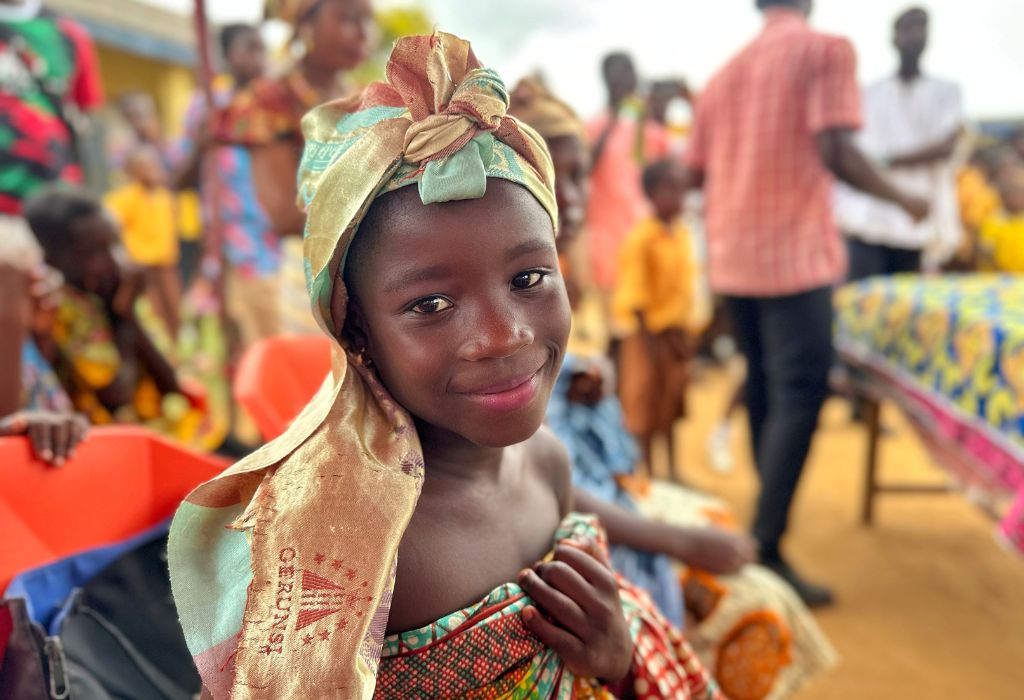
The original visa application cost £60 (paid online), but I was hesitant to send off my passport—since I needed it for another trip – I opted to visit the walk-in facility at the Premium Application Centre. If you opt for the premium service outright, you can choose your appointment date and you can visit between 9am and 2pm (Mon – Thurs).
Or if like me, you change your mind after you submitted your application but before you send off your passport, walk-ins are 3 – 4pm (Mon – Thurs) – subject to availability. This applies to the London applications – yours may be different!
To upgrade my application from the regular application to the 24-hour service, it cost an additional £80 (paid at the centre), though it was really a 48-hour service as the visa wasn’t processed until the following day. On top of that, there was a service fee of £45 (to use the Premium Application Centre) and some admin/VAT fees of £11.40, bringing the total cost to £196.40 (not including travel expenses to London).
I then had to collect my passport and visa between 5.30 – 6.30 pm on day three. You can pay an extra £20 for flexible pickup (which allows collection after the set time on the days after, but not earlier), but since I was leaving London that evening, I didn’t need it.
If you live in London and aren’t as rushed as me, they also have a 72-hour service which is cheaper. You can see all the costs here and you can see the services and fees for the Premium Application Centre here.
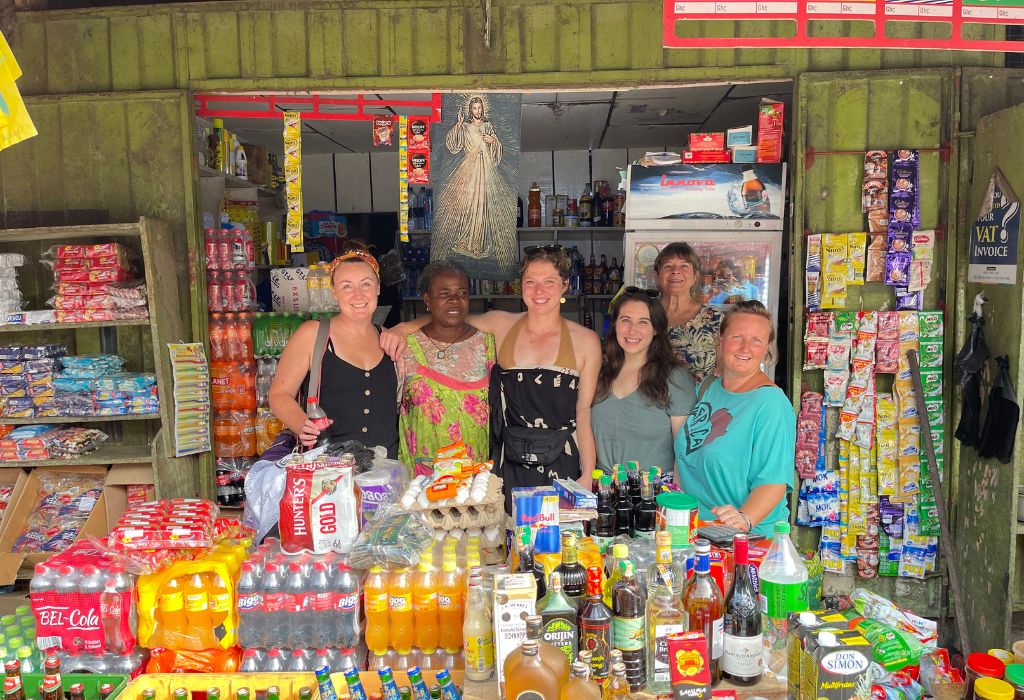
Let’s just say, it was probably the most annoying and arduous visa process I have been through in my 15 years of Africa travel. I had to upload and provide paper copies of the below:
- An invitation letter
- Copy of my host’s passport
- Names and addresses of my reference OR hotel booking
- My passport (copy and actual)
- My Yellow Fever certificate (copy)
- A picture of my signature (50 x 250 px)
- A passport photo (less than 6 months old)
- Itinerary (under 1mb and including date of entry into Ghana)
- My printed application form
As I mentioned above, when I visited in January, we were able to obtain our visas on arrival due to our trip falling within the Christmas holiday period when they were allowing this for everyone. My visa then cost $150 USD on arrival and was valid for 90 days. This was soooo much easier (and overall cheaper).
Hopefully they will do this again in future. And if so, they usually announce it on their local embassy websites. It saves a lot of time and hassle, although the process was a bit messy when we arrived at the airport in Accra.
Halfway through getting ours done, the officer stopped writing my visa, walked to the back of the office, stood and ate some food for 10 minutes and then came back and carried on as if nothing had happened. That was pretty funny and a very ‘TIA’ moment. Welcome to Ghana!
Extending Your Visa
If you want to extend your visa, you can visa extension form and photos in person to the Ghana Immigration Service (GIS) office on Independence Avenue in Accra.
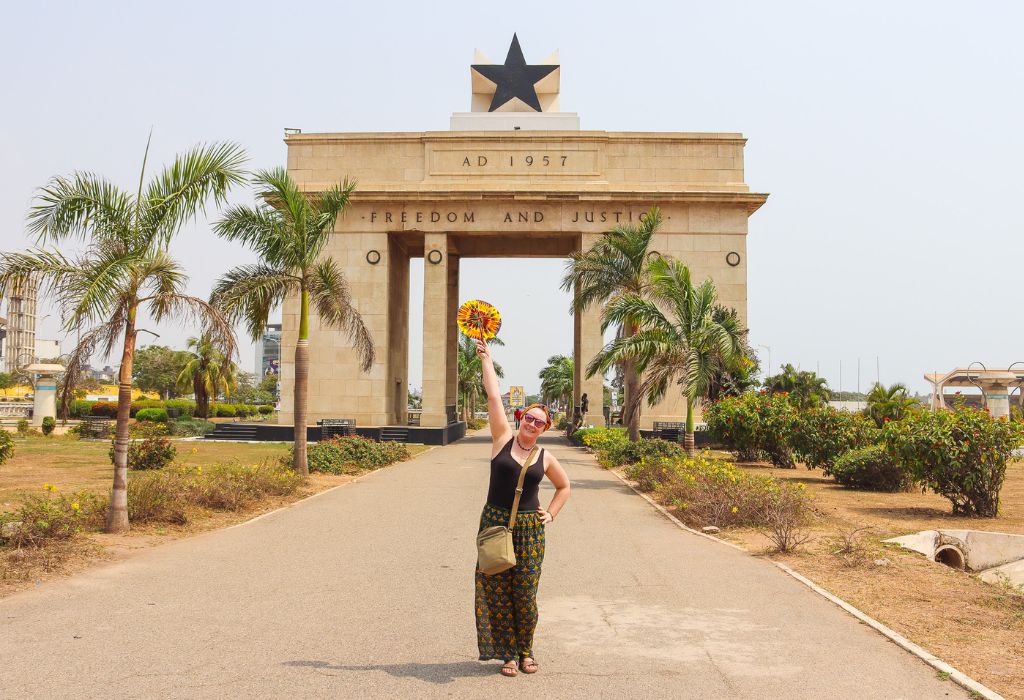
Passport
Your passport needs to be valid for at least 6 months from the date you arrive in Ghana and you’ll need a couple of pages for the visa and stamps.
Departure Flight Details
You may also need to show proof of departure (for your visa or when you check in at the airport), either a flight out of Ghana or elsewhere if travelling overland, so be prepared for that.
Yellow Fever Certificate
Before travelling to Ghana (or anywhere in Africa) you should always check whether you need a Yellow Fever vaccination.
Anyone over the age of 9 months is required to have a valid Yellow Fever vaccination certificate to enter Ghana – this is mandatory. If you are unable to receive the vaccine for medical reasons (age, auto-immune diseases), you must provide an official exemption certificate instead.
You can see more information on Yellow Fever here and here. and I’ve written about other recommended vaccinations below.
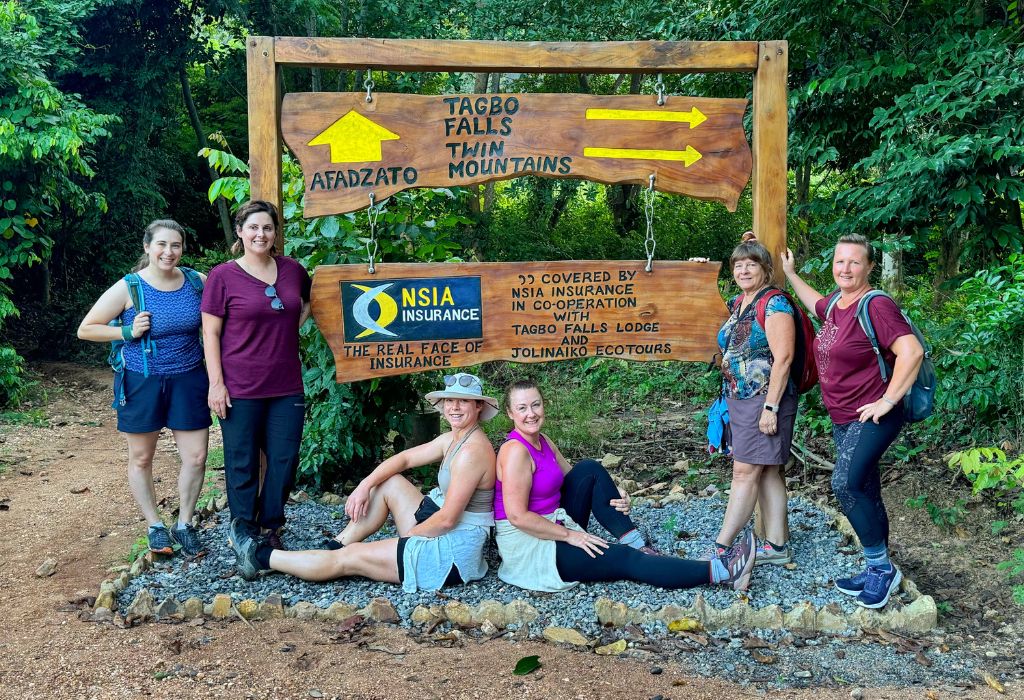
Health & Safety
Is Ghana a Safe Place to Visit?
Ghana is listed at number 4 on the list of safest countries in Africa according the Global Peace Index and number 55 in the world. In my opinion, Ghana feels very safe and the people are very friendly.
But as per usual advice when travelling, the best way to stay safe is to remain vigilant and use your common sense.
- Follow travel advisories from reputable sources, such as government travel websites (such as the FCDO or U.S. Department of State), and stay updated on local news.
- Keep your bag closed/zipped, don’t have your phone or wallet sticking out of your back pocket and don’t leave your valuables unattended. Same as you would anywhere else in the world.
- Try not to look too flashy. It’s fine to take your cameras to national parks etc, but leave your valuables at the hotel if you go out at night and don’t carry too much money in your purse/day bag.
- If you have a lot of money on you, make sure it’s well hidden. And maybe have a wallet with a small amount of money in that you don’t mind losing. Keep your valuables (passport, phone, money) well hidden in your bag.
- If you’re in a car, don’t be on your phone by an open window. It’s very easy for someone on a motorbike to snatch it out of your hand.
- Don’t walk alone at night, especially on deserted beaches or in cities, take a taxi or walk in a big group if going a short distance. If (heaven forbid) you do get robbed, don’t resist, just give them what you have.
- Keep a copy of your passport/travel documents safe at the hotel, or with a friend/family member at home, in case you lose it.
- Enjoy yourself, but remember to drink in moderation. It’s important to stay aware of your surroundings, especially in an unfamiliar place or when you’re with people you don’t know well.
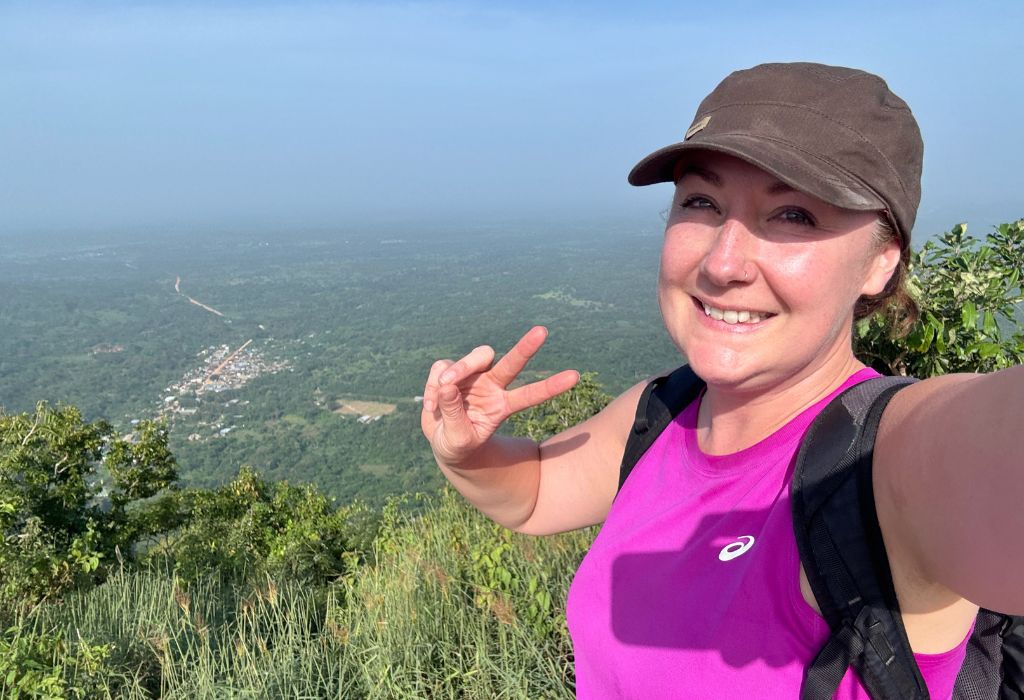
Solo Female Travel in Ghana
Based on my experiences in Africa, I can confidently say that Ghana is an excellent destination for solo female travellers. However, there are some additional challenges that come with travelling as a woman.
While you may encounter the occasional guy who approaches you to ask for your number or compliment your looks (more likely the younger you are also), most interactions are harmless and they’re just trying their luck. A friendly yet firm response will usually do the trick to get rid of them.
If you ever feel unsafe or notice someone following you, I recommend seeking out the nearest woman, elder, restaurant staff or shopkeeper. They can often help you handle the situation and get rid of any unwanted attention. Most people are good and will help you in a sticky situation!
To enhance your safety and enjoyment while traveling in Ghana, consider the following precautions:
- Limit Personal Information: Avoid sharing your phone number or where you are staying with strangers.
- Dress Modestly: Be mindful of local customs and dress appropriately.
- Avoid Walking Alone at Night: If you need to go out, opt for a taxi rather than walking alone.
- Watch Your Drinks: Never leave your drinks unattended, especially in bars and nightclubs.
- Seek Local Advice: Ask your accommodation for recommendations on safe places to visit and local customs.
- Meet in Public Spaces: If you decide to meet someone new, do so in a public setting and always inform someone where you’re going.
- Project Confidence: Even if you feel uncertain, acting confident can help you navigate social situations more easily.
- Walk With Purpose: When I walk around Africa, especially in a place I don’t know well, I walk like I’ve been there for years!
By taking these precautions, you can have a safe and enjoyable experience exploring the vibrant culture and warmth of Ghana.
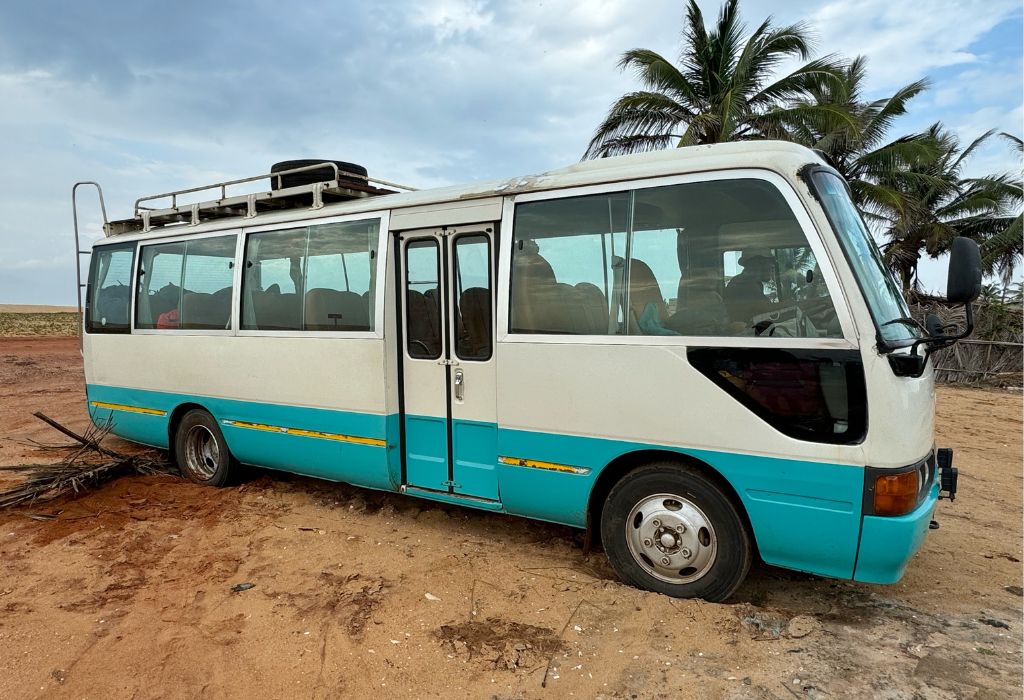
Road Safety
As with most countries in Africa, I would suggest only travelling by day, as the street lights are few and far between and some of the roads we drove on in Ghana were pretty dreadful. Not as bad as the roads in Madagascar or Sierra Leone mind you, but pretty close.
Please always wear your seatbelt, don’t get in a car with anyone who has been drinking and don’t be afraid to tell your driver to slow down if they’re going to fast.
Malaria
Malaria is prevalent in Ghana, so I would highly recommend that you take precautions to avoid being bitten and speak to your doctor or travel nurse regarding the best malaria prophylaxis for you.
To prevent being bitten, cover up your arms/legs/feet at dusk and dawn when mosquitoes are most active, use a good mosquito repellent and sleep under a mosquito net where possible.
You can find out more information about malaria in Ghana here.
Vaccinations
Apart from Yellow Fever, which is mandatory, there are no other vaccinations needed to enter the country, but it’s recommended to have your routine vaccinations (MMR, Polio, Diphtheria, Meningitis, Tuberculosis), as well as Hepatitis B (3 x vaccinations), Hepatitis A, Tetanus and Typhoid.
Your first port of call is to speak to your doctor. They should be able to advise you on what you have already had and what else you need.
A couple of great resources to use to find out what you need are the Ghana page of the NHS Fit for Travel website or the Superdrug website here.
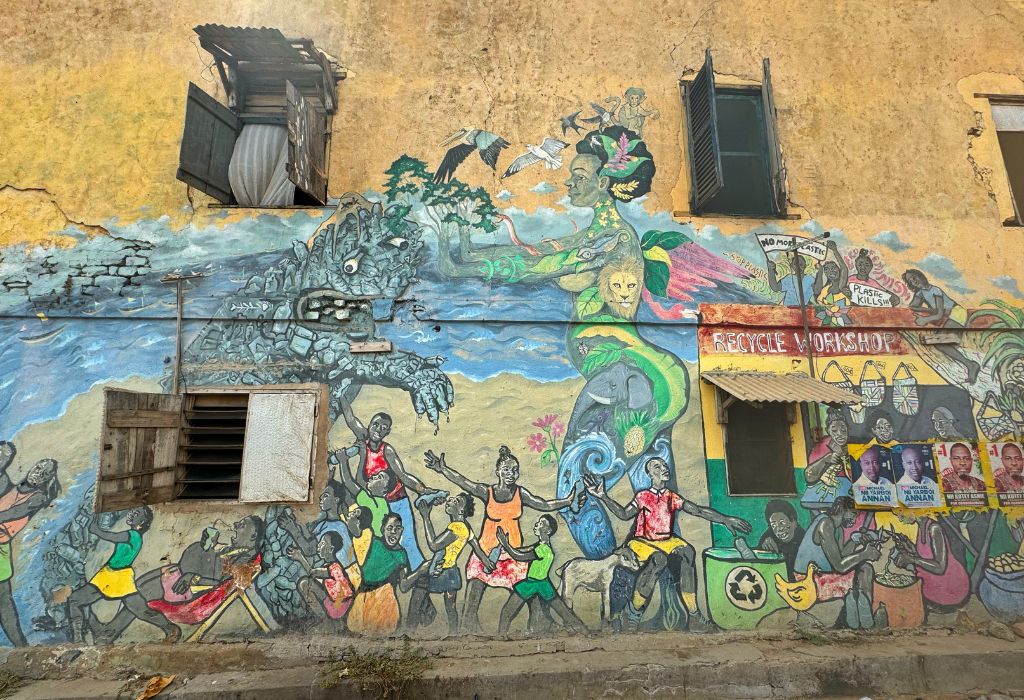
Travel Insurance
Medical care in Africa is not free, so you should have good travel insurance in place for your trip to Ghana, just in case you get injured or fall ill whilst travelling.
I would also make sure your insurance covers you for delays, curtailment (having to cut short your trip), theft, lost luggage, repatriation (in case you need to be evacuated from the country for any reason – medical or otherwise), etc. All the things!
And you should also check that you are not breaking the terms of your travel insurance by visiting any areas that have travel advisory warnings against them. At the moment this shouldn’t be an issue for Ghana, apart from in the far north around Bawku, on the border with Burkino Faso.
My current insurance is provided through my bank account with Nationwide and Switched on Insurance (who are good for longer trips). But you can also use something like Compare the Market to find providers.
Many of my American clients highly recommend Squaremouth, a travel insurance comparison platform that makes it easy to find and purchase policies from a variety of insurance companies. And then of course, World Nomads is a popular choice for many people.
The other American companies I’ve had people use incude: Trawick International, Safety Wing USI Affinity, Allianz and Mondo/Ins Global.
Money & Budgeting in Ghana
The Local Currency
In Ghana, the local currency is called the Ghanaian Cedi, sometimes written as GHS, GH₵ or ₵. These are generally only available in Ghana, so you’ll need to bring some money to exchange. USD, GBP and Euros are easily changed.
You may also be able to pay for some things on card or in USD (most accepted), GBP or Euros (for things like hotel bills and some activities), but don’t always count on it. There are ATM’s in the cities/big towns but they may not always work. In Ghana, cash is king, as they say.
Is Ghana an Expensive Place to Travel?
I wouldn’t say Ghana is a particularly expensive country compared with other places I’ve been to in Africa but it’s also not the cheapest place in Africa I’ve visited either.
Flights were reasonable from the UK. I paid £782, but I did only book a couple of weeks before, so they probably would have been quite a bit cheaper if had I booked earlier.
The visa was quite expensive – $150 for my first trip and £196.40 for the second. Ideally, it should have only cost around £60 if I’d had the time to apply through the standard process. That said, visas for West Africa are generally on the pricier side.
I found some of the accommodations in Ghana, particularly in Accra and along the coast, to be somewhat overpriced for the standard provided – especially when compared to what you might get for the same price in East Africa or Southeast Asia where there’s a lot more competition.
For example, a dorm bed at the Somewhere Nice hostel in Accra (a popular choice among backpackers) starts at $17 per night. While not excessively expensive, it’s pricier than similar hostels in East Africa, such as Jubulani Backpackers in Nairobi. That said, you do get the added bonus of air conditioning, which is a big plus in Ghana’s climate.
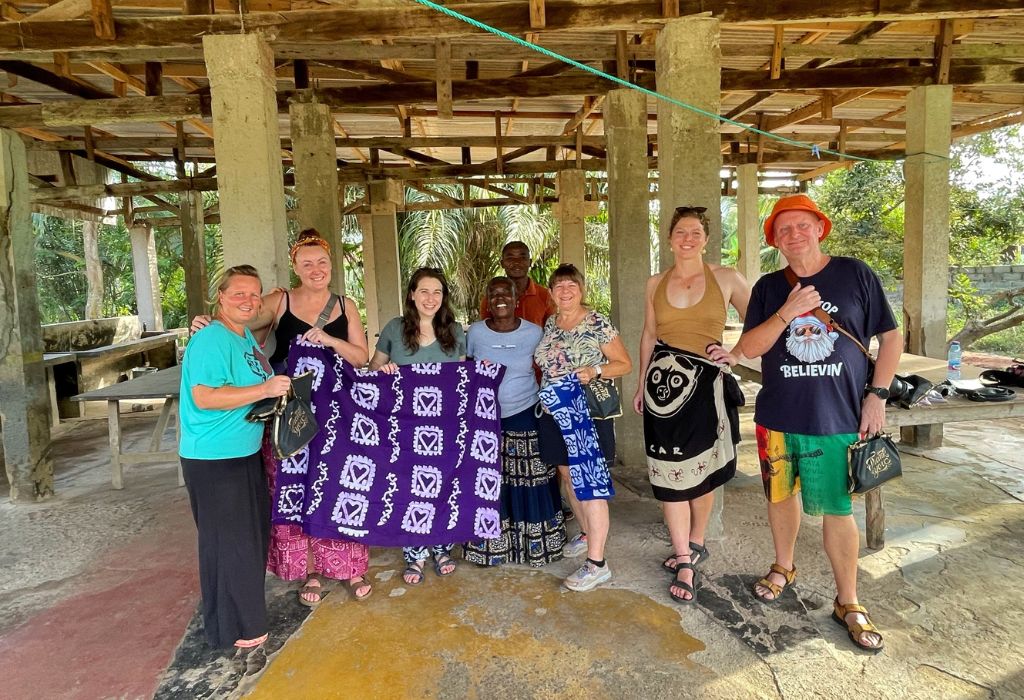
But then activities are inexpensive and I have seen some reasonably priced (compared to the likes of Kenya & Tanzania) safaris up to Mole National Park, but at the same time, you’re not going to have quite the same experience there as you would in the parks of East or Southern Africa.
Food and drinks, on the other hand, were generally reasonably priced. In Accra, modern cafes and restaurants are comparable to budget-friendly prices in the West – definitely not extravagant. If you stick to local dishes like red red or fufu at smaller, local restaurants (or even in higher-end spots), the costs are even lower.
Overall, Ghana is a relatively affordable destination to travel to, especially considering its location in West Africa, where travel costs tend to be higher.
Exchanging Money
Changing money was pretty straightforward in Ghana. We changed Euros, USD and GBP for Cedis with no issues.
I changed an initial amount at the airport on my first trip, and the rate was pretty good. Then we changed some at one of our hotels, for a similarly good rate. There are also FOREX bureaus in towns and cities.
On my second trip, we mostly changed our money with trusted local money changers that our guide knew in the markets. We changed our leftover West African Francs plus USD, Euros and GBP for Cedis in Kpalime, Togo near to the border and then again in Accra.
Then you can change any leftover Cedis back at the airport, but you will lose a bit on the exchange back, so I would try to run down your Cedis before you go.
If you’re changing somewhere official, you usually need to show your passport.
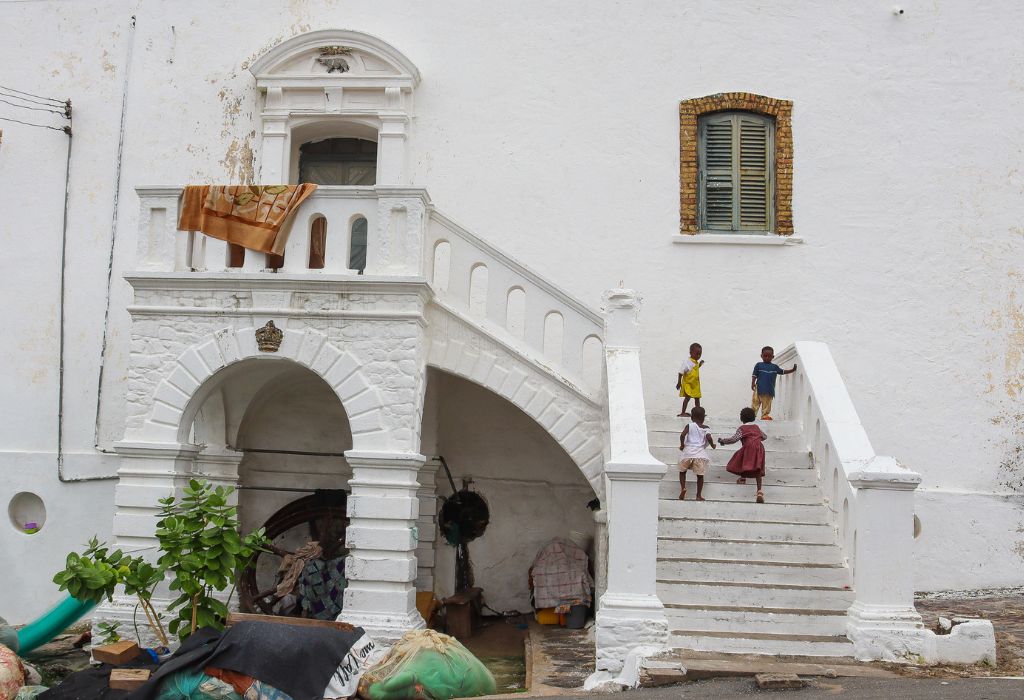
Using Your Debit & Credit Cards
Like most of Africa, Visa is generally more widely accepted than Mastercard for both paying directly and taking money out of the ATMs… but Mastercard is catching up and you will be able to use it in a lot of places! But Visa is more reliable.
I don’t think American Express is accepted in many places, so make sure you have other cards.
We used our cards to pay for some hotel bills and we were able to use them in some of the restaurants in Accra. But outside of the bigger towns and cities, cash is usually king, especially if the internet goes down or the power goes out!
There are ATMs at the airport and in all major towns around the country. You won’t find ATMs in more remote areas, so make sure you have the cash you need.
I would suggest getting a bank card that doesn’t charge you for using foreign ATMs and don’t forget to let your bank know where you are going so they don’t block your card.
Revolut also offer pre-paid Ghanaian Cedis debit cards!

Tipping in Ghana
Tipping is a well debated topic.
But I believe a tip is a tip, not wages – and we shouldn’t get in the habit of being forced to tip and allowing businesses to hike up their prices and not pay their staff properly (yes USA, I am talking to you), so I generally tend to follow the British way of tipping when I travel in Africa…
- 10% in restaurants/taxis.
- $20 per day for a main tour guide/driver – so if there’s a group of 4 people, you’d each put in ($5) per day.
- $5 – $10 for a guide that takes you for a shorter activity.
- $1 – 2 (in local currency) for someone who helps carry your bag.
- Most hotels have a tip box of sorts, so if you want to tip the hotel staff, I’d suggest $5 per day or whatever you can afford.
And this is for good service. If the service is bad, don’t tip.
Unless you’re tipping big amounts (ie. to a guide/driver you’ve had for multiple days), it’s best to tip in the local currency, as small amounts of USD/GBP/Euros are really difficult for local people to exchange.
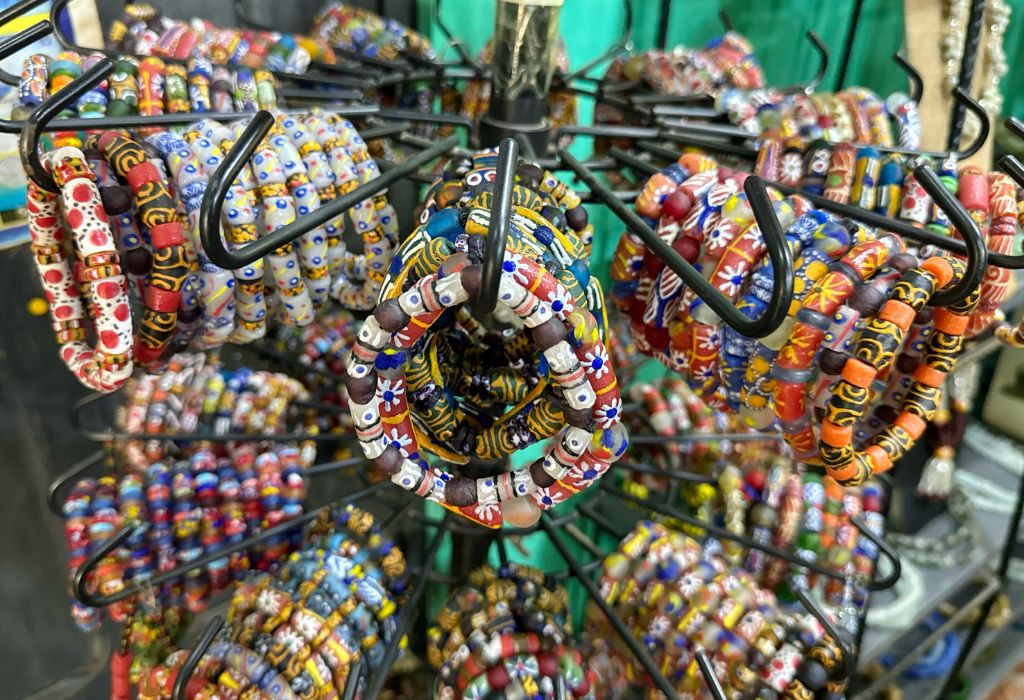
The Internet & Communication in Ghana
Staying Connected & SIM Cards
The main phone networks in Ghana are MTN, Vodafone and AirtelTigo.
My biggest mistake I made when I first visited Ghana was not getting a SIM card at the airport when I arrived, as it would have been very useful.
In country, I was told that you can’t get a SIM card without a Ghanaian ID card and I wasn’t that bothered anyway as I was only there a week.
However, I found out later that some places will let you get a SIM without a Ghana card! The airport, Accra Mall, some guy on the street corner/border… Not everywhere will let you, but some places will – it’s a bit hit and miss I believe.
You will usually need your passport, so make sure you have it with you when you go to get one. They have packages to choose from depending on how much data or how many minutes you need, and how long you’re there. You can then buy top ups as you go.
On my second trip we travelled overland and entered Ghana at a remote border where there was nowhere to purchase a SIM card, so I got an eSIM for Ghana. This was more expensive than getting a local SIM, but it was convenient.
Your home network may have an international plan or allow you to do travel bolt-ons, but these are often more expensive than getting a local SIM card or an eSIM. For instance, my provider in the UK, 02 charges £6 a day.
Many of the hotels have WiFi, but I found the internet to be a bit slow outside of Accra and Whatsapp is the easiest way to communicate in Ghana, so I did miss having that when out and about – especially when trying to get an Uber!
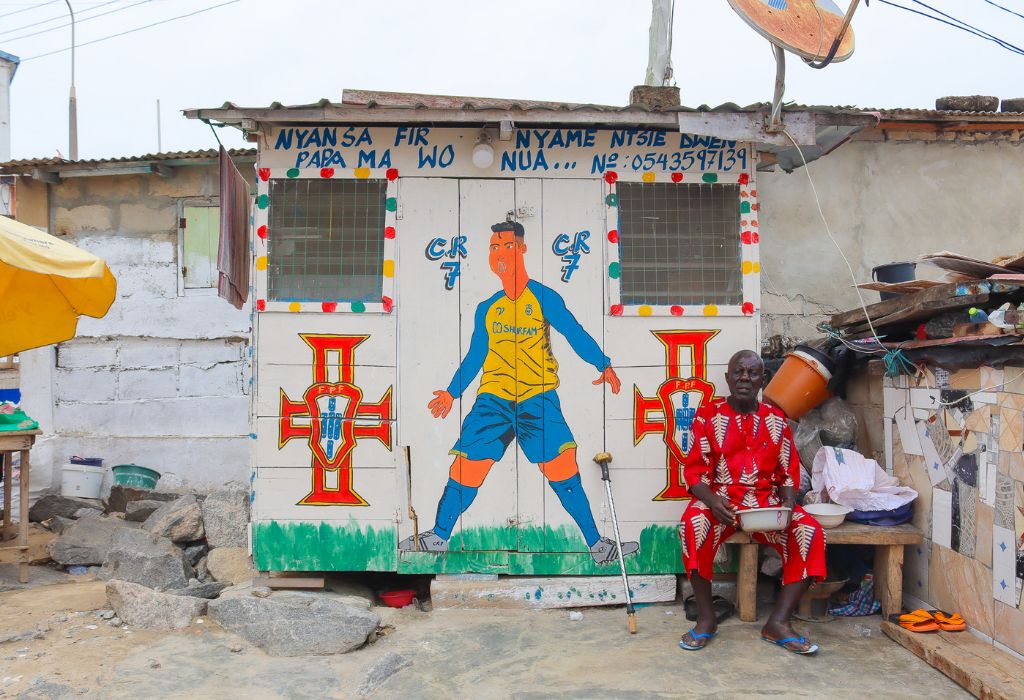
Useful Apps
Units Plus or XE Currency Converter
When traveling in a different country, having a currency converter app on your phone can be incredibly helpful. I use Units Plus as it’s easy to get confused when negotiating prices in markets or switching between currencies as you move from country to country. Even for me who is used to this!
A currency converter app takes the guesswork out of the equation, especially if maths isn’t your strong suit. It lets you quickly check the value of what you’re paying, helping you avoid overpaying or getting ripped off. It’s a simple tool that can save you money and make transactions much smoother while you travel.
Everyone in Ghana (and most of Africa) uses Whatsapp to communicate. If you don’t have it, then you may struggle, so I would suggest downloading it before you go! It’s free and easy to use.
Uber & Bolt
Uber works pretty well in Accra (and other major cities) and is very cheap, so I would recommend having it on your phone. Bolt is also available, but I haven’t used that before!
Google Maps
You probably have this on your phone anyway, but again, Google Maps is great for helping you find your way around Ghana. You may also want to consider MAPS.ME if you are driving yourself, this is great for offline maps.
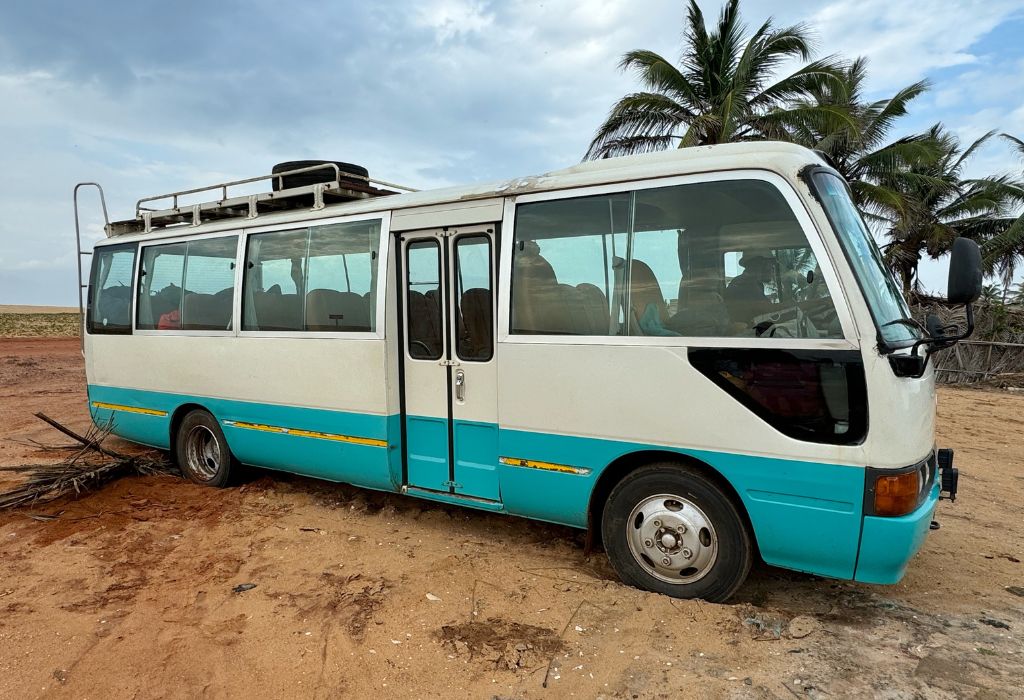
Getting Around Ghana
How to Get Around Ghana By Private Transport
The easiest way to get around Ghana (and most African countries) is with private transport. Either with your own that you drive or hire or by taking a Ghana group tour (with me)!
We looked into self-drive but with it being our first time in the country, we decided to get a driver. But if you do want to self-drive, I believe there are a few companies that rent out including Avis Ghana. Just to warn you, some of the roads are a bit crazy (the other drivers and the pot holes), so think about that when deciding whether to drive yourself or not!
And they drive on the right in Ghana.
You can also hire a car and driver. For this, you’ll pay around $70 – $150 per day usually for a car, driver and fuel. So the more people you are, the cheaper this will be. We paid $100 per day for a car with aircon.
We just had a regular car as it was dry season and we didn’t need a 4×4 where we were going, but if travelling in the rainy season or going anywhere remote or into a national park, a 4×4 would be best (and more expensive).
There are plenty of taxis about, but for long journeys they won’t be much cheaper than hiring a driver and may be more expensive.
As mentioned, in some of the cities and larger towns, they have Uber and Bolt. These are great for short journeys around the city and very cheap.
We managed to get an Uber from Kokrobite Beach (near Accra) to Elmina (approx 140 km and a 3.5 hour drive one way) for about 350 Cedis ($30) – however, when he arrived, he said that was too little (and I agreed, as it would be unlikely he’d find another pick up for the way back) so we settled on 600 Cedis.
However, we tried to find an Uber for the way back and couldn’t, so we ended up hiring a local taxi driver through our hotel which cost… 1,200 Cedis. And it broke down just outside of Accra – although he did find us another driver and paid for him to take us the rest of the way.
Taking a Ghana (plus Benin & Togo) group tour with me is also an excellent idea… then you don’t have to worry about transport (or much else) at all.
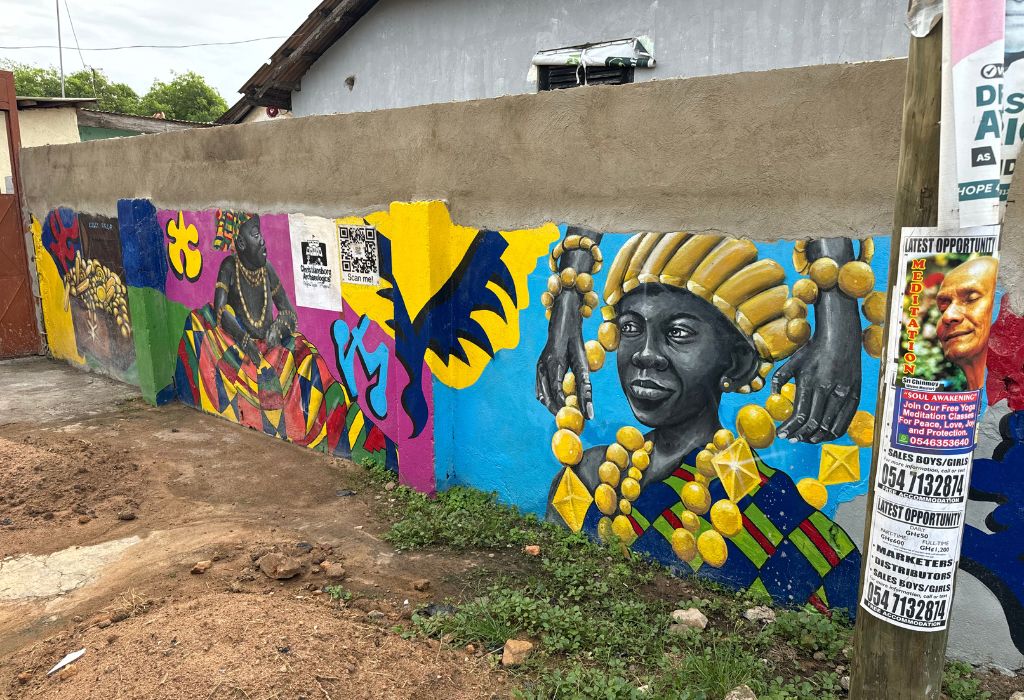
How to Get Around Ghana By Public Transport
Ghana has a couple of big bus companies (STC and VIP) that connect major towns and cities with big, air-conditioned coaches and scheduled departures. It’s usually best to book these in advance – even if just a day or two ahead.
There are, of course, plenty of other bus companies of various standards. But for reliability and safety, you’d be best sticking to the main companies.
The local minibusses are called tro-tros. These are the cheapest, but not always the quickest, most comfortable or safest way to get around. But, for a short distance they can be quite fun and a good way to experience everyday life in Ghana. And they are great if you’re backpacking Ghana on a budget.
You can pick these up at the side of the road almost everywhere. There will be a conductor (also called a ‘mate’) who will shout the destination out through the window (or open door) and collect your money.
You can also take them from the local bus stations – just be aware that if you take them from the station, they usually won’t leave until they’re full.
I haven’t experienced the trains in Ghana, but I believe there are some lines up and running, so check when you get there. Travelling by train is one of my favourite ways to travel!
There are a couple of local airlines operating internal flights (including Africa World Airlines and PassionAir), but I personally prefer travelling overland for the experience, but that’s just me.
Language in Ghana
There are over 80 local languages spoken in Ghana, including Twi, Ga and Ewe.
Fortunately for English speakers, Ghana stands out from its neighboring countries, which predominantly have French as their official language, by having English as its official language. It’s widely spoken across the country, and we rarely encountered any communication issues. Most of the time, it was very easy to converse with the local people in English.
I always say that learning a few basic phrases in the local languages goes a long way (see below).
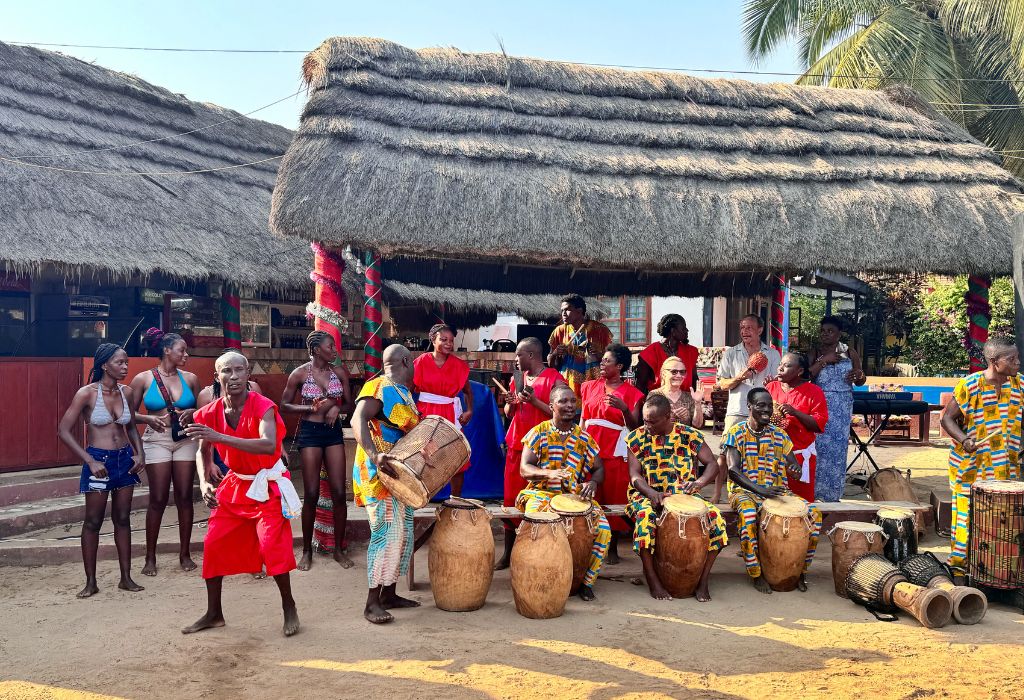
Food & Drink in Ghana
Ghanaian Food
I really enjoyed trying Ghanaian food during my visit, although I wasn’t a big fan of fufu, a staple dish made from boiled cassava, plantains (or sometimes yams), water, salt, and a bit of oil. While the taste is mild and inoffensive, the texture didn’t quite appeal to me.
We had a mix of local dishes and Western-style meals, and I particularly loved red red, a flavourful dish made with black-eyed peas and palm oil, often served with fried plantains. Jollof rice is another favourite, along with fried fish and peanut sauce.
For vegetarians, waakye is an excellent option. It’s a combination of rice and beans, and it’s both filling and delicious. Be warned, though – the hot sauces in Ghana are seriously spicy! If you’re not used to intense heat, it’s best to proceed with caution.
Other things you might see on the menu are shito, a spicy black pepper sauce made from dried fish and chilli and banku, a fermented mix of corn and cassava dough, usually eaten with soups, stews, or grilled fish.
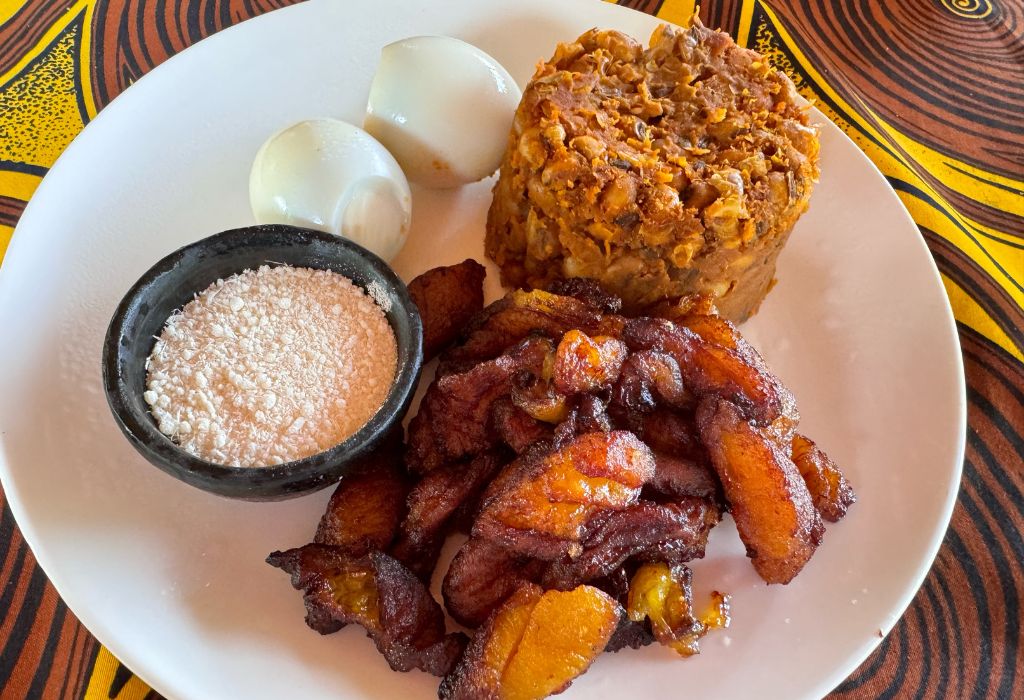
Water & Soft Drinks
It isn’t advised to drink the water in Ghana, so I would suggest that you only brush your teeth with and drink bottled or filtered water.
Bottled water is available to purchase from street stalls, shops, tourist attractions and hotels. Some restaurants and hotels also provide filtered water for drinking and brushing teeth.
If you want to avoid plastic waste, you have a few options:
- You can bring your own regular water bottle and buy a big plastic bottle (5 litres) from some supermarkets to decant into your bottle as needed.
- You could get a bottle that filters tap water for drinking, such as a Lifestraw. The downside is that you cannot use these to brush your teeth.
- For both drinking and brushing your teeth, you may want to consider a UV water cleaning device, such a Steripen or a LARQ Self-cleaning Water Bottle which both use UV light to kill bacteria in water and are rechargeable… but they are a more expensive investment in the short-term.
Sobolo is a local soft drink made with hibiscus leaves and ginger. Then sodas (like Coca-Cola, Sprite and Fanta) are sold everywhere and are very cheap.
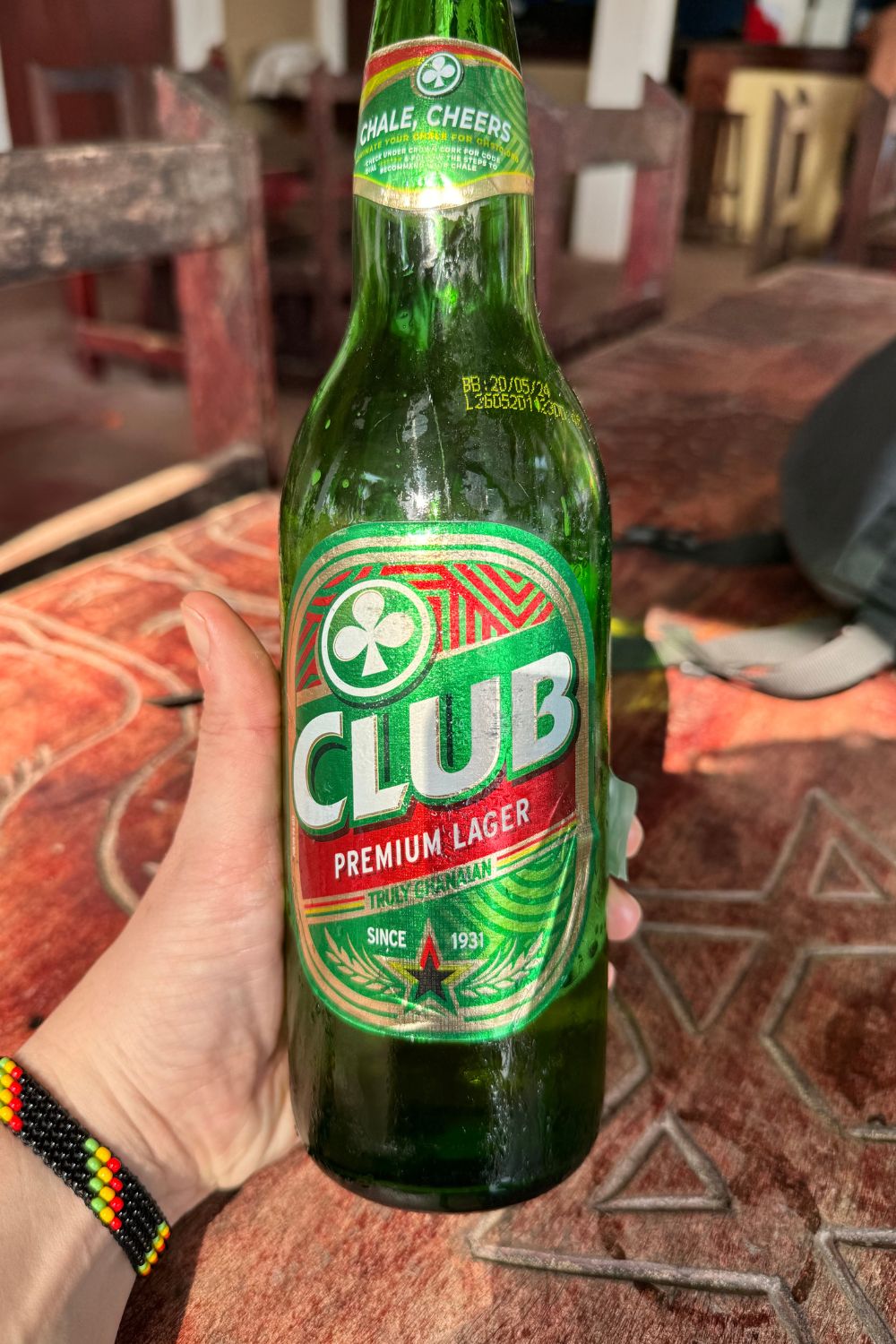
Local Beer & Alcohol
The famous local bottled beers in Ghana are Club and Star. I’m not a fan of beer on its own, but I did have quite a few Club Shandys (which you can buy by the bottle), and they were very nice and refreshing.
Then there’s pito, the more local beer that you’ll find in the villages, which is made with fermented sorghum or millet and the national spirit which is called akpeteshie, which is made by by distilling palm wine (another popular local drink) or sugar cane.
My friend Daniel sells it on his website in the UK if you want to try it yourself.
Other popular drinks in Ghana include Cody’s Vody and Grands Chateaux Sangria Forte. They are sold everywhere from bars, to shops and gas stations. They are cheap but incredibly strong – 18%! You have been warned! Oh, and if you ever see a drink in West Africa called ‘Sunset Max’ – avoid it like the plague.
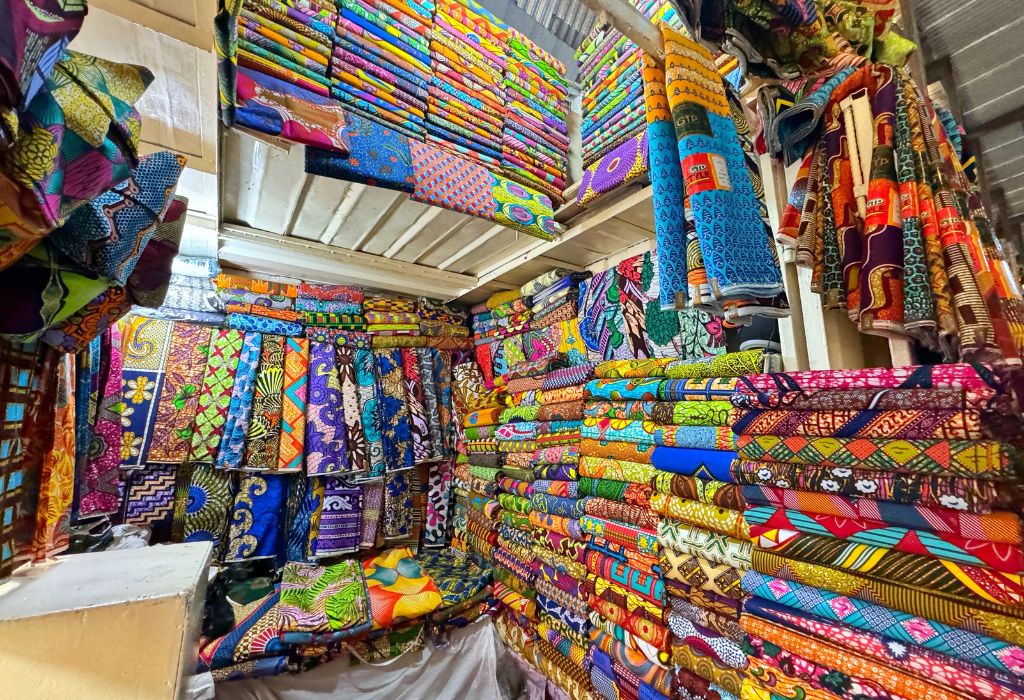
Useful Tips & Cultural Considerations in Ghana
You’ll Love the Shopping
Ghana is an amazing place to shop if that’s your thing! There’s a huge craft market in Accra (Accra Arts Centre), plus the awesome Makola Market where you can buy anything and everything! Plus plenty of shops and a smaller market in Osu.
Then there are lots of other places to buy things around the country. Things to look out for include kente cloth, African and batik fabrics, wood carvings, paintings, clothing and beaded jewellery – which holds cultural, historical, and spiritual significance in Ghana.
I would highly recommend checking out the Global Mamas shops in Accra or Cape Coast. Oh My God, I almost bought everything. They have beautiful batik clothing, accessories and homeware – we practically had to be dragged out of the shop!
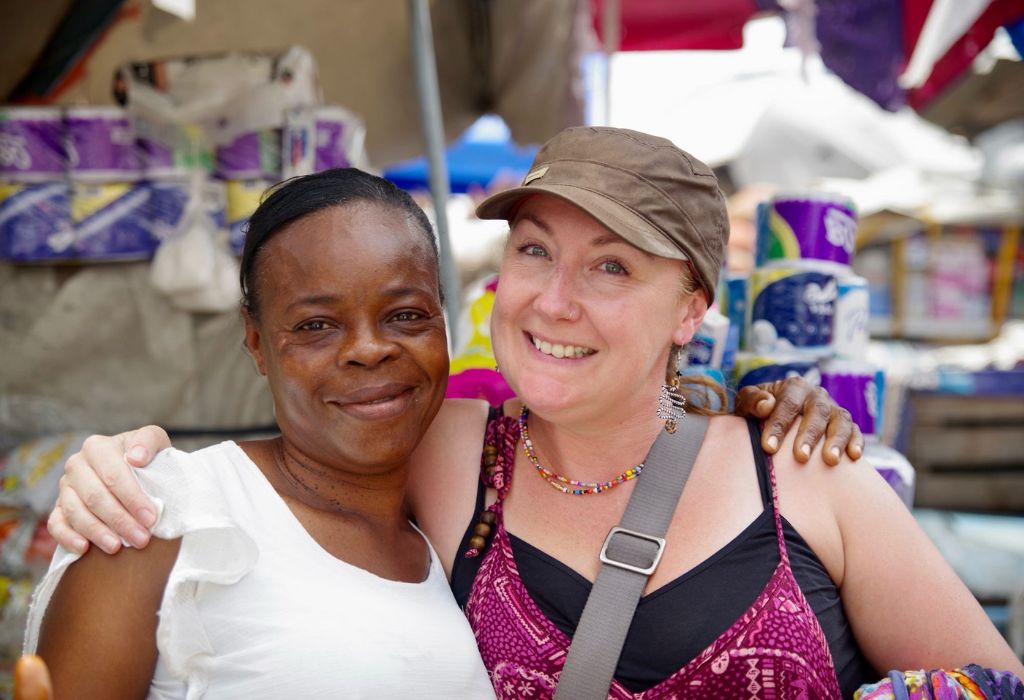
Greetings are Important
Ghanaians are incredibly friendly and like most of Africa, greetings and formalities are incredibly important and you should always greet with a ‘Hello, how are you?’ before launching into anything else. A handshake is often appreciated too. Even better if you know how to do the ‘African’ handshake.
And if you’re meeting any kind of ‘Chief’, make sure you’re extra ‘greety’ and ask permission to visit the village etc. Chiefs in West Africa like things done a certain way and in a certain order from my experience.
Learn a Bit of the Local Language
As I mentioned, greetings are important. But what’s also very much appreciated, is an attempt at the local languages. Some useful phrases are (although, just bear in mind there are lots of languages):
- Hello: Ete sen
- Good morning: Mema wo akye
- Good afternoon: Maaha
- Good evening: Maadwo
- Welcome: Akwaaba
- Thank you: Me da wo ase/Medaase
- Goodbye: Skyire
- How are you? : Wo ho te sen?
- I am fine: Me ho ye

What to Wear in Ghana
It’s advisable to dress modestly in Ghana, particularly when visiting rural areas, markets, villages, religious, or historical sites. Modest dress typically means avoiding very short shorts and super tight/revealing clothing.
If you’re visiting a market in Ghana, it’s a good idea to dress modestly to blend in and show respect for local customs. When we were in Elmina, we decided to stop by the fish market during a bike ride. My friend happened to be wearing tight, bum-hugging cycling shorts, which definitely drew a lot of attention – especially from the women at the market.
Sensing the situation, we left the market and she quickly bought a piece of fabric (as you can see above) and tied it around her waist. We then went back to the market to show the ladies that she had covered up and they were so happy and started dancing with us (see below)! A little effort to respect local norms can go a long way!
In Accra, the dress code is more relaxed, and you’ll notice people wearing less conservative clothing, but you should still dress relatively conservatively when in town.
Interestingly, while modesty is generally appreciated, it’s common to see women breastfeeding openly, so exposed breasts in this context are not considered inappropriate.
Throughout the country, you’ll find beautiful Kente fabric for sale. It’s a great opportunity to have a traditional outfit custom-made as a unique souvenir and a way to immerse yourself in Ghanaian culture.
I’ll write a proper West Africa packing list soon!
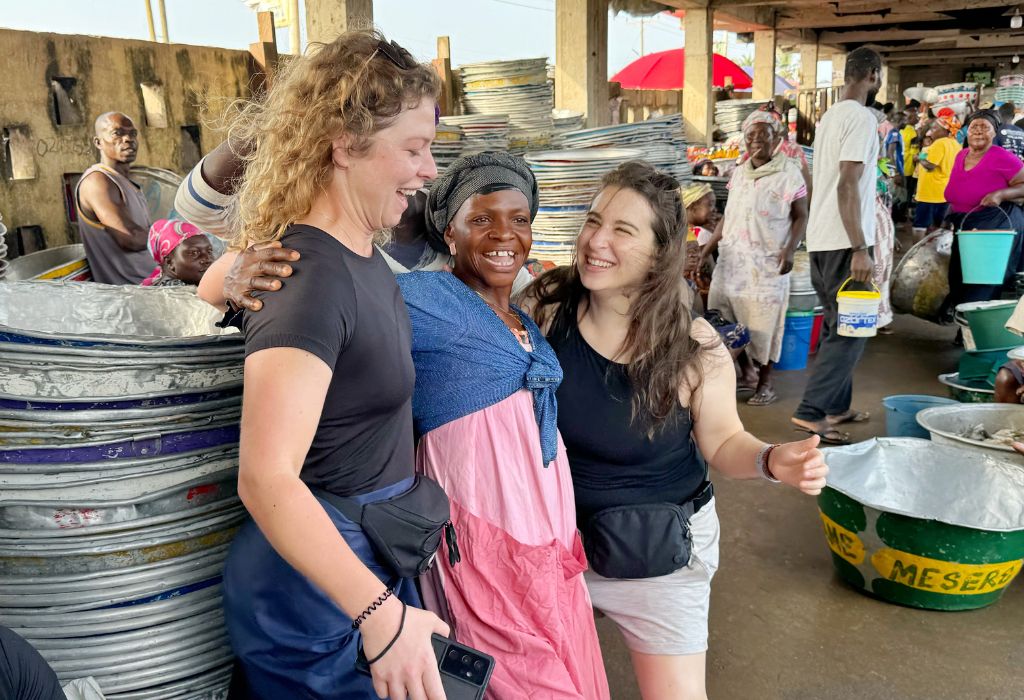
LGBTQ+ in Ghana
Unfortunately, Ghana’s laws criminalise same-sex sexual activity, and the government has passed a strict new bill imposing prison sentences of up to three years for individuals convicted of identifying as LGBTQ+.
You can read more about it here.
Taking Photographs
As with much of Africa, you should always ask permission before photographing people in Ghana. General street scenes are usually fine, but no-one loves having a camera pointed in their face without consent!
In my experience, if you talk to people first and strike up a rapport, they usually don’t mind having their pictures taken, but you just need to read the situation – and if in doubt ask!
Check Out the Fantasy Coffins
Check out a ‘Fantasy Coffin’ workshop. These are not just any old coffins, but coffins designed by the Ga people to represent the life of the deceased person. They can be in the shape of anything – a Coke bottle, a chicken, a banana, an airplane, a book – you name it.
There’s a story about a Ghanaian prostitute who was buried in a coffin shaped like a… penis. I’ve heard this from numerous sources, however I also read that it was for a man who performed circumcisions. Who know, but either way – it’s pretty interesting!
Ghana is An Incredible Country
Ghana is very accessible and one of my favourite countries in Africa, with rich cultural heritage, pretty beaches, a great arts scene and good food – and I am 100% sure that you will love it if you go!
Other West Africa posts you might enjoy…
- 15 Things to Know Before You Visit Benin: Voodoos and Voodon’ts
- The Best Things To Do in Sierra Leone & Itinerary
- 18 Things You Should Know Before Visiting Sierra Leone
- Sweet, Sweet Salone: What It’s Like to Travel in Sierra Leone
If you would like to join one of my Ghana group trips click here for details.
Any other tips for travelling in Ghana? Please let me in the comments!
Pin This Post For Later
